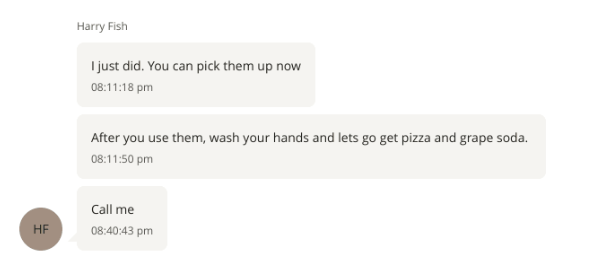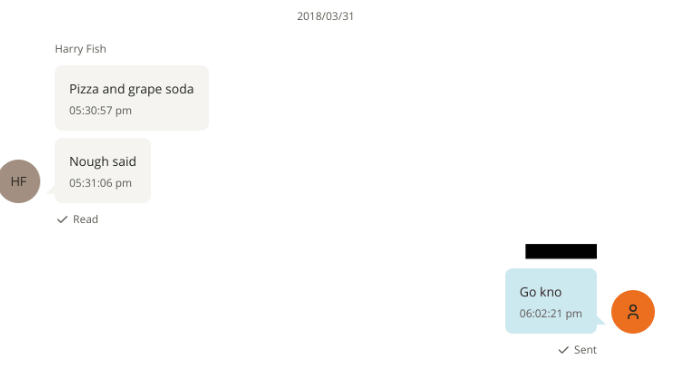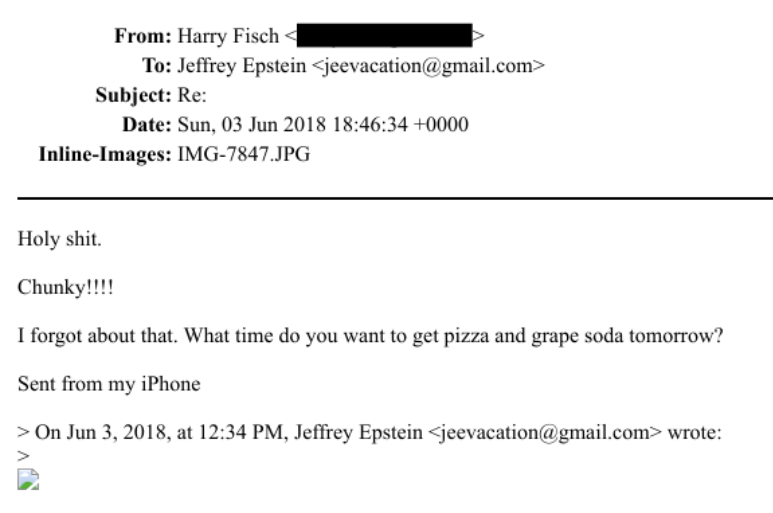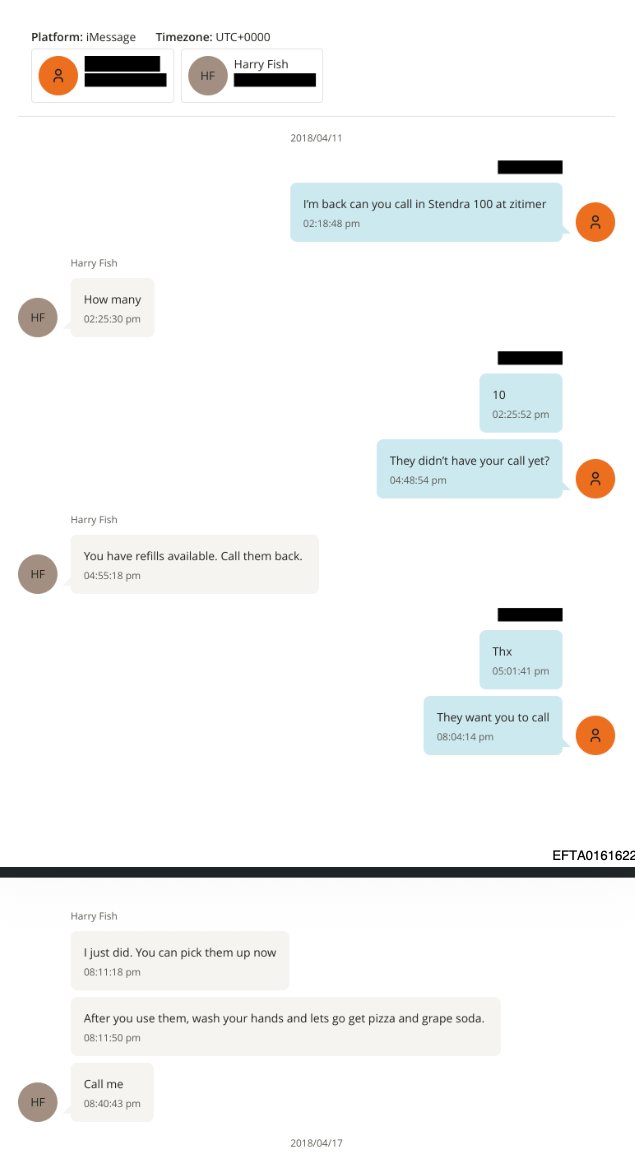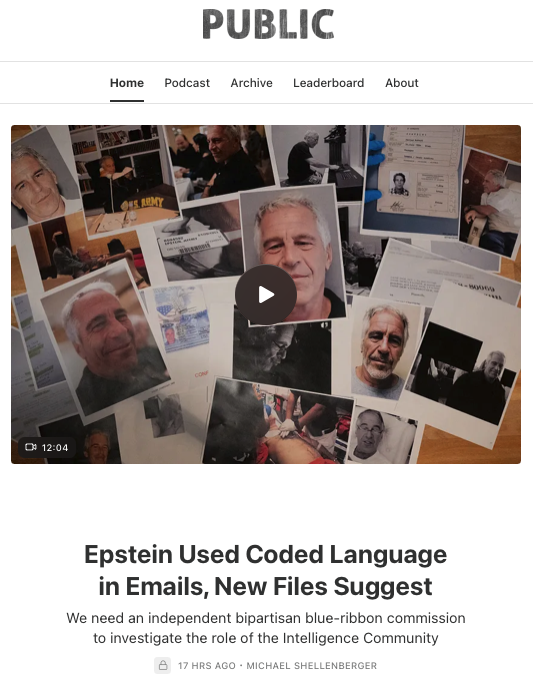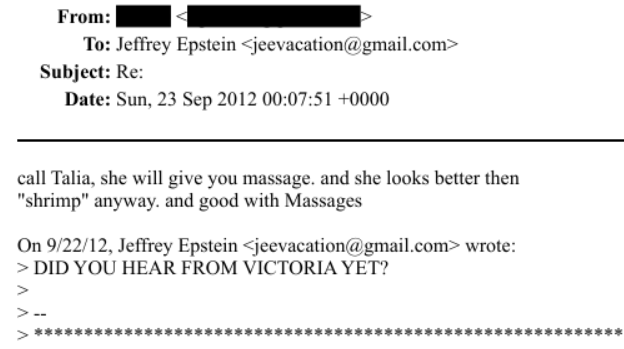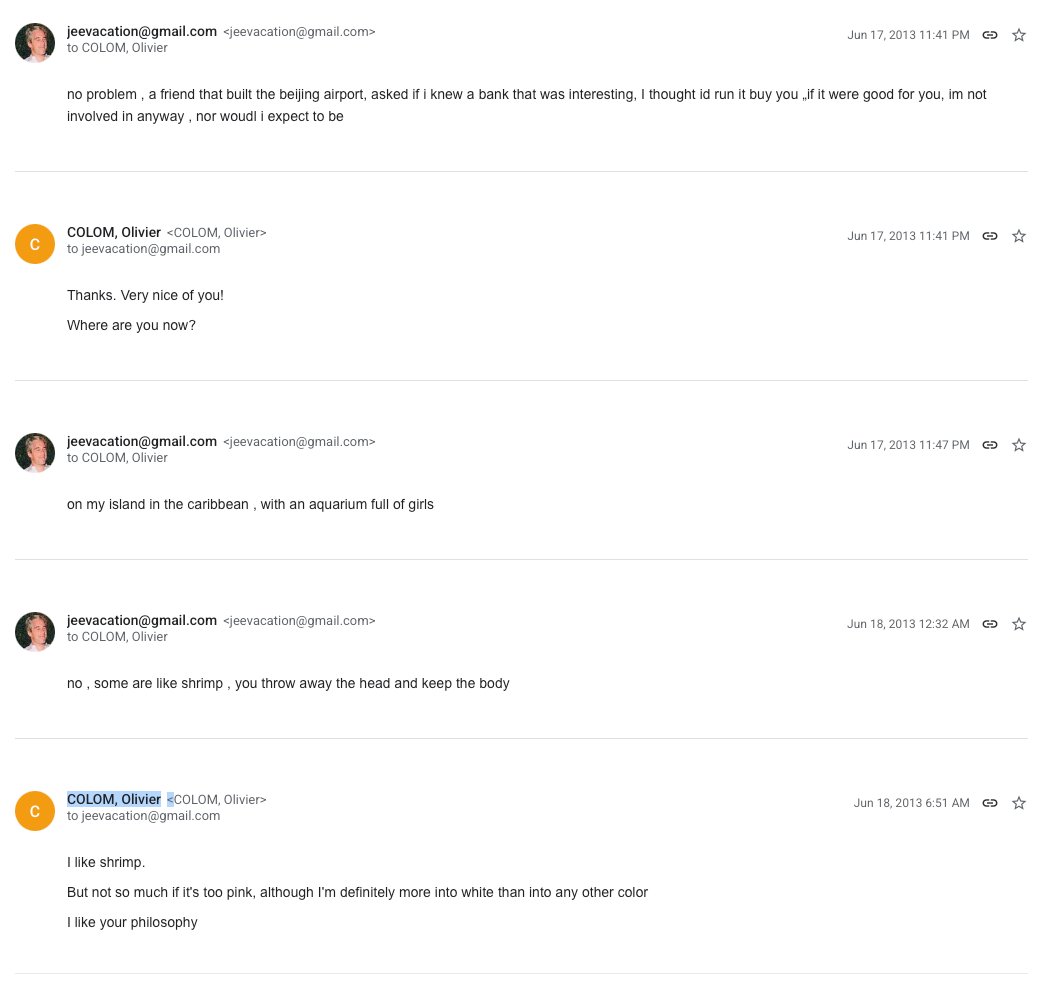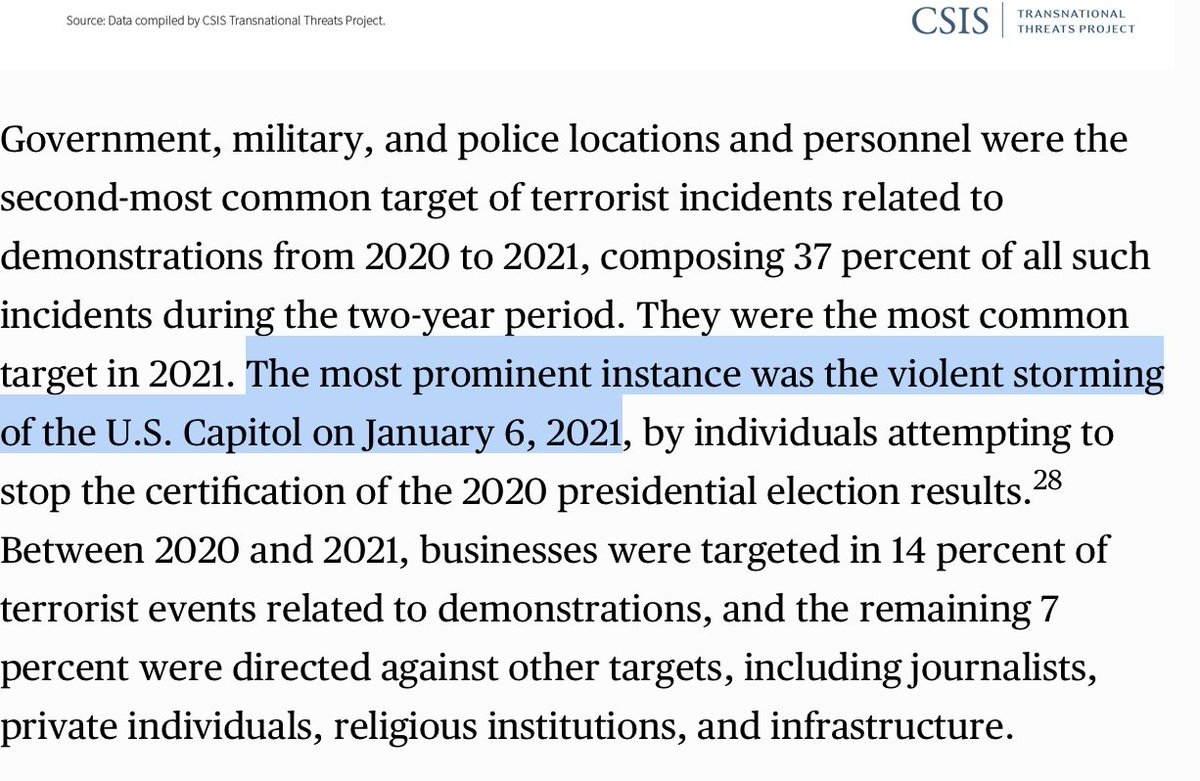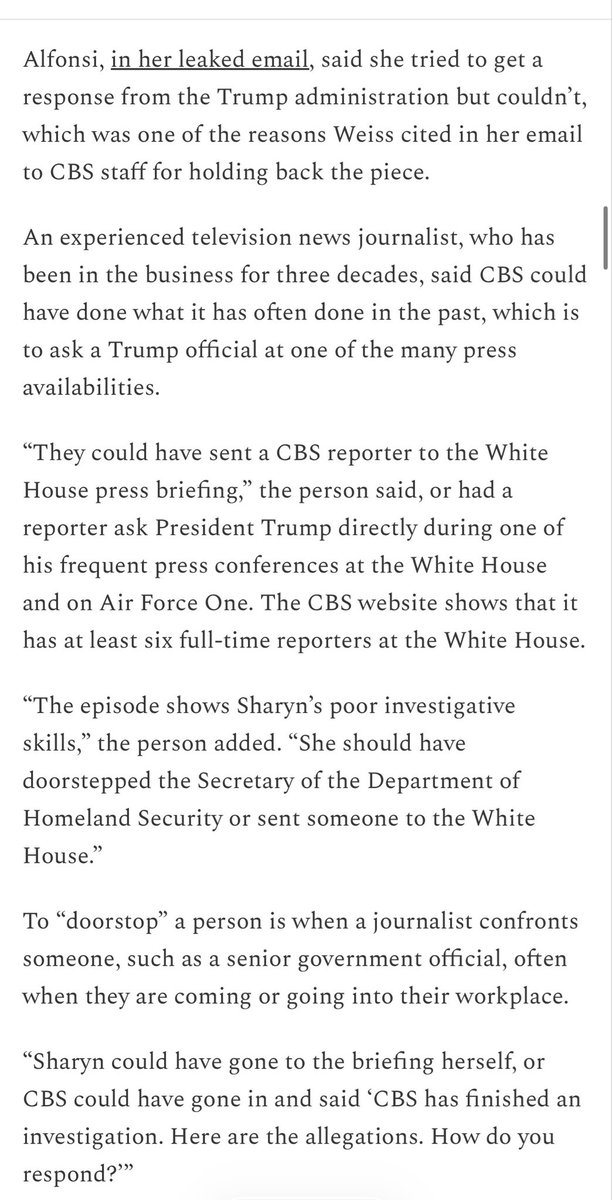TWITTER FILES - CIA
The Central Intelligence Agency (CIA) is the most famous of the 18 US government agencies that comprise the Intelligence Community (IC) of the United States of America. Unlike the Federal Bureau of Investigations (FBI), the law strictly prohibits CIA employees or contractors from spying upon or running clandestine operations against American citizens on US soil.
But now, a new Twitter Files investigation reveals that a member of the Board of Trustees of the CIA’s mission-driven venture capital firm and ostensibly “former” IC and CIA analysts were involved in a 2021-2022 effort to take over Twitter’s content management system.
The effort also involved:
— a long-time IC contractor and senior Department of Defense R&D official who spent years developing technologies to detect whistleblowers (“insider threats”) like Edward Snowden and Wikileaks’ leakers;
— the proposed head of the DHS’ aborted Disinformation Governance Board, Nina Jankowicz, who aided US military and NATO “hybrid war” operations in Europe;
— Jim Baker, who, as FBI General Counsel, helped start the Russiagate hoax, and, as Twitter’s Deputy General Counsel, urged Twitter executives to censor The New York Post story about Hunter Biden.
These existing or former IC employees, contractors, or intermediaries weren’t satisfied with simply controlling Twitter. They also wanted to use PayPal, Amazon Web Services, and GoDaddy in a totalizing effort to de-platform, de-monetize, and excommunicate from the Internet entirely those individuals that the IC et al. deems to be a threat.
There is much that we still do not know about the effort. We do not know if officials within the CIA or any other IC organization ran the operation. It is possible that the only individuals involved in the effort were the ones we discovered. And none of the individuals involved responded to our request for information except for one.
But thousands of pages of Twitter Files and documents contained therein paint a clear picture of an organized operation by existing or former IC employees and contractors, using well-established IC tradecraft, to take control of Twitter’s content moderation.
Our investigation comes at a moment when governments and intelligence agencies around the world are stepping up their efforts to monitor and censor their citizens. It thus has large implications for policymakers and the public in Western nations that look to the US as a model for free speech and citizen control of the military.
This is a joint Public-Racket investigation. The authors are @Shellenberger @MTaibbi and @GalexyBrane. As always, the only condition we agreed to in publishing this was to first publish on X. At the end of this thread, we explain why and how this investigation began.
Here we go...
The Central Intelligence Agency (CIA) is the most famous of the 18 US government agencies that comprise the Intelligence Community (IC) of the United States of America. Unlike the Federal Bureau of Investigations (FBI), the law strictly prohibits CIA employees or contractors from spying upon or running clandestine operations against American citizens on US soil.
But now, a new Twitter Files investigation reveals that a member of the Board of Trustees of the CIA’s mission-driven venture capital firm and ostensibly “former” IC and CIA analysts were involved in a 2021-2022 effort to take over Twitter’s content management system.
The effort also involved:
— a long-time IC contractor and senior Department of Defense R&D official who spent years developing technologies to detect whistleblowers (“insider threats”) like Edward Snowden and Wikileaks’ leakers;
— the proposed head of the DHS’ aborted Disinformation Governance Board, Nina Jankowicz, who aided US military and NATO “hybrid war” operations in Europe;
— Jim Baker, who, as FBI General Counsel, helped start the Russiagate hoax, and, as Twitter’s Deputy General Counsel, urged Twitter executives to censor The New York Post story about Hunter Biden.
These existing or former IC employees, contractors, or intermediaries weren’t satisfied with simply controlling Twitter. They also wanted to use PayPal, Amazon Web Services, and GoDaddy in a totalizing effort to de-platform, de-monetize, and excommunicate from the Internet entirely those individuals that the IC et al. deems to be a threat.
There is much that we still do not know about the effort. We do not know if officials within the CIA or any other IC organization ran the operation. It is possible that the only individuals involved in the effort were the ones we discovered. And none of the individuals involved responded to our request for information except for one.
But thousands of pages of Twitter Files and documents contained therein paint a clear picture of an organized operation by existing or former IC employees and contractors, using well-established IC tradecraft, to take control of Twitter’s content moderation.
Our investigation comes at a moment when governments and intelligence agencies around the world are stepping up their efforts to monitor and censor their citizens. It thus has large implications for policymakers and the public in Western nations that look to the US as a model for free speech and citizen control of the military.
This is a joint Public-Racket investigation. The authors are @Shellenberger @MTaibbi and @GalexyBrane. As always, the only condition we agreed to in publishing this was to first publish on X. At the end of this thread, we explain why and how this investigation began.
Here we go...
https://x.com/shellenberger/status/1604902028852924416
Nina Jankowicz And The Alethea Group
Before the IC’s attempt to infiltrate Twitter and control its content moderation, several of the operatives involved made the case for treating “disinformation” as a security threat that requires intelligence and military tactics to combat.
On June 11, 2020, a little-known book publisher (“I.B. Tauris”) published Nina Jankowicz’s How to Lose the Information War: Russia, Fake News, and the Future of Conflict, which argues for “info war” like the kind the US government waged in Ukraine and Eastern Europe.
Nina Jankowicz (Getty Images)
In her book, Jankowicz compares the lack of regulation of speech on social media regulations to the lack of government regulation of automobiles in the 1960s. She calls for a “cross-platform” and public-private approach, so whatever actions are taken are taken by Google, Facebook, and Twitter, simultaneously.
Jankowicz points to Europe as the model for regulating speech. “Germany’s NetzDG law requires social media companies and other content hosts to remove ‘obviously illegal’ speech within twenty-four hours,” she says, “or face a fine of up to $50 million.”
By contrast, in the US, she laments, “Congress has yet to pass a bill imposing even the most basic of regulations related to social media and election advertising.”
The purpose of her book is to sound the alarm and offer a vision.
“The Biden-Harris administration can, and should, take up many of the solutions outlined in this book,” she writes. If the West is to win the “information war,” it needs a whole-of-society response, like the US and NATO used in Eastern Europe. She praises a NATO cyber security expert for having created a “Center of Excellence.”
If that term sounds familiar to close observers of the Censorship Industrial Complex, it might be because Renée Diresta of the Stanford Internet Observatory, in 2021, promoted a “Center of Excellence” in a Department of Homeland Security video she recorded, in which she made the case for the Disinformation Governance Board Jankowicz would later, briefly, head up.
One year later, Jankowicz would work with an anti-disinformation consulting firm to Twitter staffed by “former” IC analysts. Its name was Alethea Group.
Before the IC’s attempt to infiltrate Twitter and control its content moderation, several of the operatives involved made the case for treating “disinformation” as a security threat that requires intelligence and military tactics to combat.
On June 11, 2020, a little-known book publisher (“I.B. Tauris”) published Nina Jankowicz’s How to Lose the Information War: Russia, Fake News, and the Future of Conflict, which argues for “info war” like the kind the US government waged in Ukraine and Eastern Europe.
Nina Jankowicz (Getty Images)
In her book, Jankowicz compares the lack of regulation of speech on social media regulations to the lack of government regulation of automobiles in the 1960s. She calls for a “cross-platform” and public-private approach, so whatever actions are taken are taken by Google, Facebook, and Twitter, simultaneously.
Jankowicz points to Europe as the model for regulating speech. “Germany’s NetzDG law requires social media companies and other content hosts to remove ‘obviously illegal’ speech within twenty-four hours,” she says, “or face a fine of up to $50 million.”
By contrast, in the US, she laments, “Congress has yet to pass a bill imposing even the most basic of regulations related to social media and election advertising.”
The purpose of her book is to sound the alarm and offer a vision.
“The Biden-Harris administration can, and should, take up many of the solutions outlined in this book,” she writes. If the West is to win the “information war,” it needs a whole-of-society response, like the US and NATO used in Eastern Europe. She praises a NATO cyber security expert for having created a “Center of Excellence.”
If that term sounds familiar to close observers of the Censorship Industrial Complex, it might be because Renée Diresta of the Stanford Internet Observatory, in 2021, promoted a “Center of Excellence” in a Department of Homeland Security video she recorded, in which she made the case for the Disinformation Governance Board Jankowicz would later, briefly, head up.
One year later, Jankowicz would work with an anti-disinformation consulting firm to Twitter staffed by “former” IC analysts. Its name was Alethea Group.

“A CIA Analyst’s Guide to Spotting Fake News”
On July 28, 2020, a little-known teen and young adult book publisher released True or False: A CIA Analyst’s Guide to Spotting Fake News, by Cindy Otis, a former CIA analyst.
“I had wanted to work for the CIA almost my whole life,” she writes. “Almost all governments, including the United States, have used fake news as a weapon to influence events in other countries.”
One year later, she would become a senior analyst for Alethea Group.
We did not hear back from Cindy Otis. However, Jankowicz told us over email that Otis “led research at Alethea through July 2021.” Jankowicz said, “My full time employment with Alethea began September 13, 2021. Ms. Otis left Alethea prior to that period. To my knowledge, she has not been employed with Alethea since that time.”
“My work with Alethea Group as a consultant (summer 2021) was narrowly focused on my subject matter expertise related to Russia,” she said. “I conducted Russian language translation and provided cultural analysis. When I joined Alethea as an employee (fall 2021) my work was entirely focused on public products: Changes to Alethea’s website, editing public reports, liaising with media, etc.”
But that claim contradicts Alethea’s Statement of Work contract with Twitter, which lists her as “Technical Research Director” for work relating to Twitter’s management of misinformation during the 2020 election, and specifically a “retrospective analysis of how then President Trump or other key figures may have violated Twitters [sic] policies, or otherwise leveraged the platform in a way that may have contributed to key events…”
Alethea Group founder, Lisa Kaplan, told us that Jankowicz “was never given the title Technical Research Director, that is a reference to a labor category for a contract.” Added Kaplan, “We respect client confidentiality and do not discuss relationships with our customers. In reviewing Nina’s timesheets she did provide support to one client that I cannot disclose, however I can confirm that while she was employed as the Director for External Affairs, Nina never conducted work at Alethea on behalf of Twitter.”
When shown the Statement of Work listing her as “Supplier Personnel,” Jankowicz said, “I have never seen this document before. A statement of work is generally a speculative document that informs clients of potential staffing and work plans. They are usually crafted to allow contractors a degree of flexibility in implementation by listing staff even if they are not assigned to a particular project in case they might do future work for that project. I assume this is what happened in this case.”
In fact, the Statement of Work between Alethea and Twitter was a formal contract between the two firms, signed by Alethea’s Founder and CEO and Twitter’s Senior Director and Associate General Counsel, and the contract specifies, “Any changes to the above listed Personnel must be approved by Twitter in writing.” There is no record in the Twitter Files of any chance to personnel.
Jankowicz added, “Ms. Otis and I were friends and colleagues prior to my short stint there and remain friends and colleagues. Yes, I knew Ms. Otis had worked — emphasis on the past tense — at the CIA. That does not constitute a ‘relationship’ with the intelligence community.”
In the acknowledgments to True or False, Otis thanks someone named Peiter “Mudge” Zatko, who also blurbs her book, which he calls a “guidebook to learning from the past with actionable solutions to help you save our future."
On July 28, 2020, a little-known teen and young adult book publisher released True or False: A CIA Analyst’s Guide to Spotting Fake News, by Cindy Otis, a former CIA analyst.
“I had wanted to work for the CIA almost my whole life,” she writes. “Almost all governments, including the United States, have used fake news as a weapon to influence events in other countries.”
One year later, she would become a senior analyst for Alethea Group.
We did not hear back from Cindy Otis. However, Jankowicz told us over email that Otis “led research at Alethea through July 2021.” Jankowicz said, “My full time employment with Alethea began September 13, 2021. Ms. Otis left Alethea prior to that period. To my knowledge, she has not been employed with Alethea since that time.”
“My work with Alethea Group as a consultant (summer 2021) was narrowly focused on my subject matter expertise related to Russia,” she said. “I conducted Russian language translation and provided cultural analysis. When I joined Alethea as an employee (fall 2021) my work was entirely focused on public products: Changes to Alethea’s website, editing public reports, liaising with media, etc.”
But that claim contradicts Alethea’s Statement of Work contract with Twitter, which lists her as “Technical Research Director” for work relating to Twitter’s management of misinformation during the 2020 election, and specifically a “retrospective analysis of how then President Trump or other key figures may have violated Twitters [sic] policies, or otherwise leveraged the platform in a way that may have contributed to key events…”
Alethea Group founder, Lisa Kaplan, told us that Jankowicz “was never given the title Technical Research Director, that is a reference to a labor category for a contract.” Added Kaplan, “We respect client confidentiality and do not discuss relationships with our customers. In reviewing Nina’s timesheets she did provide support to one client that I cannot disclose, however I can confirm that while she was employed as the Director for External Affairs, Nina never conducted work at Alethea on behalf of Twitter.”
When shown the Statement of Work listing her as “Supplier Personnel,” Jankowicz said, “I have never seen this document before. A statement of work is generally a speculative document that informs clients of potential staffing and work plans. They are usually crafted to allow contractors a degree of flexibility in implementation by listing staff even if they are not assigned to a particular project in case they might do future work for that project. I assume this is what happened in this case.”
In fact, the Statement of Work between Alethea and Twitter was a formal contract between the two firms, signed by Alethea’s Founder and CEO and Twitter’s Senior Director and Associate General Counsel, and the contract specifies, “Any changes to the above listed Personnel must be approved by Twitter in writing.” There is no record in the Twitter Files of any chance to personnel.
Jankowicz added, “Ms. Otis and I were friends and colleagues prior to my short stint there and remain friends and colleagues. Yes, I knew Ms. Otis had worked — emphasis on the past tense — at the CIA. That does not constitute a ‘relationship’ with the intelligence community.”
In the acknowledgments to True or False, Otis thanks someone named Peiter “Mudge” Zatko, who also blurbs her book, which he calls a “guidebook to learning from the past with actionable solutions to help you save our future."

“Disinformation will become the next iteration of warfare…the government should identify vulnerable populations”
On July 9, 2020, Kaplan records a podcast on “The Next Iteration of Warfare.” She says:
— “A lot of the way that this is approached, at least from a defensive perspective, is a lot of the same lessons that we learned from counterterrorism and social media,” she explains. “Where are the ISIS guys in chat rooms trying to recruit people to fly to Raqqa [in Syria]?”
— “I'm not going to sit here and tell you guys in your audience the history of warfare, but when we think about the fact that governments have always had a monopoly on the mechanisms needed to conduct war and then, you know, obviously, we have had an emergence of terrorism and this feels like the next iteration of warfare in the sense that these tactics to cause chaos, these tactics to sow discord, they're, they're more diffuse….”
— “Nobody is better positioned I think than the United States government to fight disinformation with the wealth of resources and analytic capabilities and intel that the government is able to get about these disinformation campaigns.
Like Jankowicz and Otis, Kaplan urges regulation, saying, “The US Government has unmatched capacity to address disinformation, but needs to work towards legislation that will allow it to act in this space.”
One year earlier, Kaplan had founded the Alethea Group.
“I've always been fortunate to work in organizations where we've been mission-driven and part of a team, and we're all working to accomplish a goal together.”
On July 9, 2020, Kaplan records a podcast on “The Next Iteration of Warfare.” She says:
— “A lot of the way that this is approached, at least from a defensive perspective, is a lot of the same lessons that we learned from counterterrorism and social media,” she explains. “Where are the ISIS guys in chat rooms trying to recruit people to fly to Raqqa [in Syria]?”
— “I'm not going to sit here and tell you guys in your audience the history of warfare, but when we think about the fact that governments have always had a monopoly on the mechanisms needed to conduct war and then, you know, obviously, we have had an emergence of terrorism and this feels like the next iteration of warfare in the sense that these tactics to cause chaos, these tactics to sow discord, they're, they're more diffuse….”
— “Nobody is better positioned I think than the United States government to fight disinformation with the wealth of resources and analytic capabilities and intel that the government is able to get about these disinformation campaigns.
Like Jankowicz and Otis, Kaplan urges regulation, saying, “The US Government has unmatched capacity to address disinformation, but needs to work towards legislation that will allow it to act in this space.”
One year earlier, Kaplan had founded the Alethea Group.
“I've always been fortunate to work in organizations where we've been mission-driven and part of a team, and we're all working to accomplish a goal together.”
“I am being asked by Schumer’s NSA if we have been in touch with Obama”
At 5:22 pm on July 15, 2020, the Twitter account for then-presidential candidate Joe Biden tweeted, “I am giving back to the community. All Bitcoin sent to the address below will be sent back doubled! If you send $1,000, I will send back $2,000.”
Similar faked spam tweets had been sent from accounts belonging to Barack Obama, Michael Bloomberg, and Elon Musk.
Wrote a senior attorney for Twitter, “I am being asked by Schumer's NSA [National Security Advisor] if we have been in touch with Obama... Matt Masterson from DHS called me on my personal cell — didn’t know he had my number. He has been in touch w Biden Campaign… He offered to help in whatever way they can. Offered a forensic analysis.”
Two weeks later, the police arrested Graham Ivan Clark, 17, for masterminding the hack. Clark had used a simple “phishing” con to trick Twitter employees into giving him information.

At 5:22 pm on July 15, 2020, the Twitter account for then-presidential candidate Joe Biden tweeted, “I am giving back to the community. All Bitcoin sent to the address below will be sent back doubled! If you send $1,000, I will send back $2,000.”
Similar faked spam tweets had been sent from accounts belonging to Barack Obama, Michael Bloomberg, and Elon Musk.
Wrote a senior attorney for Twitter, “I am being asked by Schumer's NSA [National Security Advisor] if we have been in touch with Obama... Matt Masterson from DHS called me on my personal cell — didn’t know he had my number. He has been in touch w Biden Campaign… He offered to help in whatever way they can. Offered a forensic analysis.”
Two weeks later, the police arrested Graham Ivan Clark, 17, for masterminding the hack. Clark had used a simple “phishing” con to trick Twitter employees into giving him information.
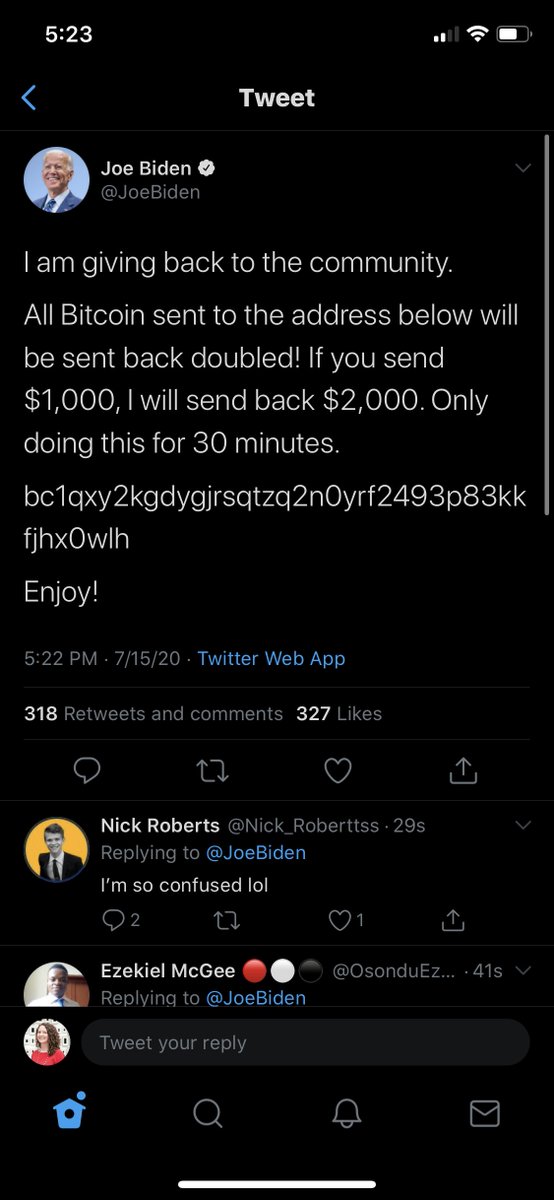
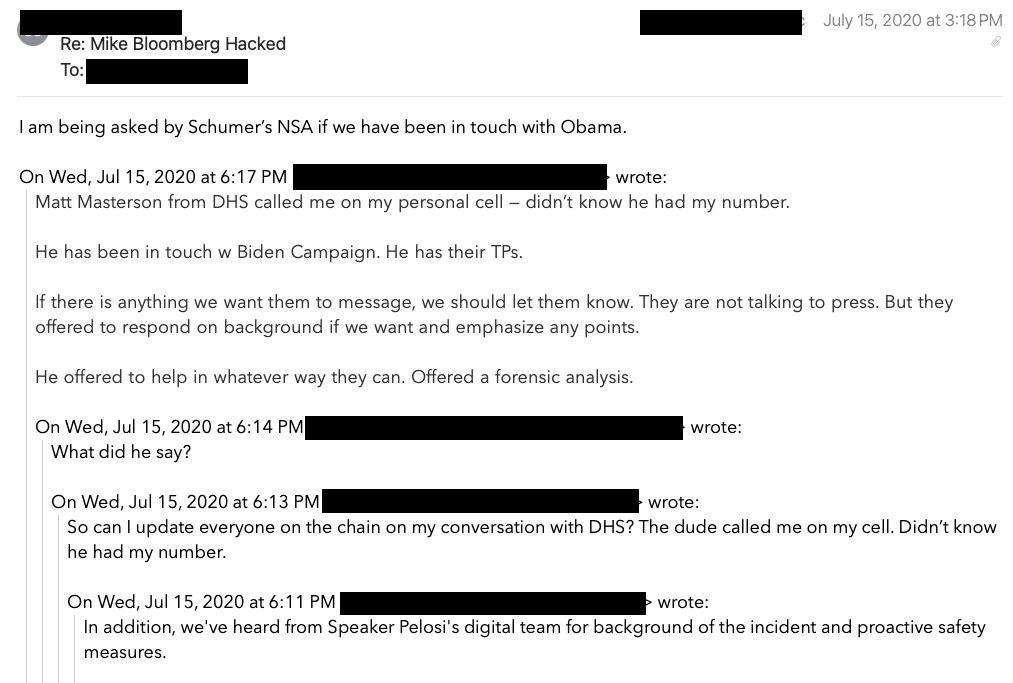
“One of the world’s best-regarded hackers”
On October 13, 2020, a Twitter executive emailed then-CEO Jack Dorsey to say, “Mudge signed.”
Dorsey’s hiring of Zatko was big news. Wrote Reuters, “Social media giant Twitter Inc, under increased threat of regulation and plagued by serious security breaches, is appointing one of the world's best-regarded hackers to tackle everything from engineering missteps to misinformation.”
Peiter "Mudge" Zatko (Getty Images)
“The company on Monday named Peiter Zatko, widely known by his hacker handle Mudge," wrote Reuters, “to the new position of head of security, giving him a broad mandate to recommend changes in structure and practices.”

On October 13, 2020, a Twitter executive emailed then-CEO Jack Dorsey to say, “Mudge signed.”
Dorsey’s hiring of Zatko was big news. Wrote Reuters, “Social media giant Twitter Inc, under increased threat of regulation and plagued by serious security breaches, is appointing one of the world's best-regarded hackers to tackle everything from engineering missteps to misinformation.”
Peiter "Mudge" Zatko (Getty Images)
“The company on Monday named Peiter Zatko, widely known by his hacker handle Mudge," wrote Reuters, “to the new position of head of security, giving him a broad mandate to recommend changes in structure and practices.”


“Zatko had engaged with members of US intelligence agencies”
Attitudes toward Zatko would be quite different two years later.
Zatko turned whistleblower, sued the company, and settled for $7.75 million. He then filed a complaint with the Justice Department, SEC, and FTC, alleging Twitter executives had misled the government, been negligent in protecting user data, and had violated a 2011 consent decree with the FTC.
Somebody leaked Zatko’s complaint to the Washington Post, which reached out to Twitter for comment on August 19, 2022.
In a shared Google Doc, dated August 21, 2022, called “Comms Statements/Tracking,” Twitter executives fine-tuned the language for responding to the news media about Zatko’s allegations.
Buried deep within that discussion was this revelatory sentence:
“Without the knowledge or support of management or the Board, Twitter learned that Zatko had engaged with members of US intelligence agencies and sought to enter a formal agreement that would allow him to work with them and provide information to them.”
Attitudes toward Zatko would be quite different two years later.
Zatko turned whistleblower, sued the company, and settled for $7.75 million. He then filed a complaint with the Justice Department, SEC, and FTC, alleging Twitter executives had misled the government, been negligent in protecting user data, and had violated a 2011 consent decree with the FTC.
Somebody leaked Zatko’s complaint to the Washington Post, which reached out to Twitter for comment on August 19, 2022.
In a shared Google Doc, dated August 21, 2022, called “Comms Statements/Tracking,” Twitter executives fine-tuned the language for responding to the news media about Zatko’s allegations.
Buried deep within that discussion was this revelatory sentence:
“Without the knowledge or support of management or the Board, Twitter learned that Zatko had engaged with members of US intelligence agencies and sought to enter a formal agreement that would allow him to work with them and provide information to them.”

FLASHBACK: The US Intelligence Community’s effort to penetrate Twitter
On Dec 20, 2019, Elvis Chan, the FBI’s liaison to social media companies, emailed a Twitter executive. “My colleagues at the Fort had a query for you.”
“The Fort” is IC slang for Fort Meade, Maryland, where the National Security Agency (NSA), the IC agency focused on spying through signals intelligence, is located.
Chan’s NSA colleagues wanted to know if Twitter would please change a security policy so that NSA could better use Twitter data.
The request immediately raised red flags from Twitter’s Head of Site Integrity, Yoel Roth.
“My sense is that a call directly with the IC on this isn’t a great idea,” said Roth. “We’re threading a needle on this one—where we both want to keep law enforcement and the IC engaged on election integrity issues while maintaining our strong anti-surveillance stance on the data front.”
The request bothered others at Twitter.
“We have seen a sustained (If uncoordinated) effort by the IC to push us to share more information and change our API policies,” said Carlos Monje, Twitter’s Director of Policy, in response to Roth.
But the IC’s "sustained effort" may have been more coordinated than it appeared.



On Dec 20, 2019, Elvis Chan, the FBI’s liaison to social media companies, emailed a Twitter executive. “My colleagues at the Fort had a query for you.”
“The Fort” is IC slang for Fort Meade, Maryland, where the National Security Agency (NSA), the IC agency focused on spying through signals intelligence, is located.
Chan’s NSA colleagues wanted to know if Twitter would please change a security policy so that NSA could better use Twitter data.
The request immediately raised red flags from Twitter’s Head of Site Integrity, Yoel Roth.
“My sense is that a call directly with the IC on this isn’t a great idea,” said Roth. “We’re threading a needle on this one—where we both want to keep law enforcement and the IC engaged on election integrity issues while maintaining our strong anti-surveillance stance on the data front.”
The request bothered others at Twitter.
“We have seen a sustained (If uncoordinated) effort by the IC to push us to share more information and change our API policies,” said Carlos Monje, Twitter’s Director of Policy, in response to Roth.
But the IC’s "sustained effort" may have been more coordinated than it appeared.




“I'd recommend Alethea group”
On January 7, 2021, the day after the Capitol Hill riot, Zatko makes his first big recommendation to Twitter executives: hire the Alethea Group.
“I feel an external investigation may be quite valuable,” said Zatko over the company’s Slack messaging system. “I'd recommend Alethea group for the disinformation angle.”
Twitter authorized Zatko to do so. A few weeks later Zatko pitched Twitter’s legal team on hiring Alethea for a January 6 focused project.
“As folks can understand,” Zatko wrote on February 24, 2021,”there's a lot still going on around Jan 6th and the 2020 election in general. Alethea is a boutique consultancy that specializes on disinformation and counter-messaging operations. They have been working with myself and Yoel [Roth].”

On January 7, 2021, the day after the Capitol Hill riot, Zatko makes his first big recommendation to Twitter executives: hire the Alethea Group.
“I feel an external investigation may be quite valuable,” said Zatko over the company’s Slack messaging system. “I'd recommend Alethea group for the disinformation angle.”
Twitter authorized Zatko to do so. A few weeks later Zatko pitched Twitter’s legal team on hiring Alethea for a January 6 focused project.
“As folks can understand,” Zatko wrote on February 24, 2021,”there's a lot still going on around Jan 6th and the 2020 election in general. Alethea is a boutique consultancy that specializes on disinformation and counter-messaging operations. They have been working with myself and Yoel [Roth].”
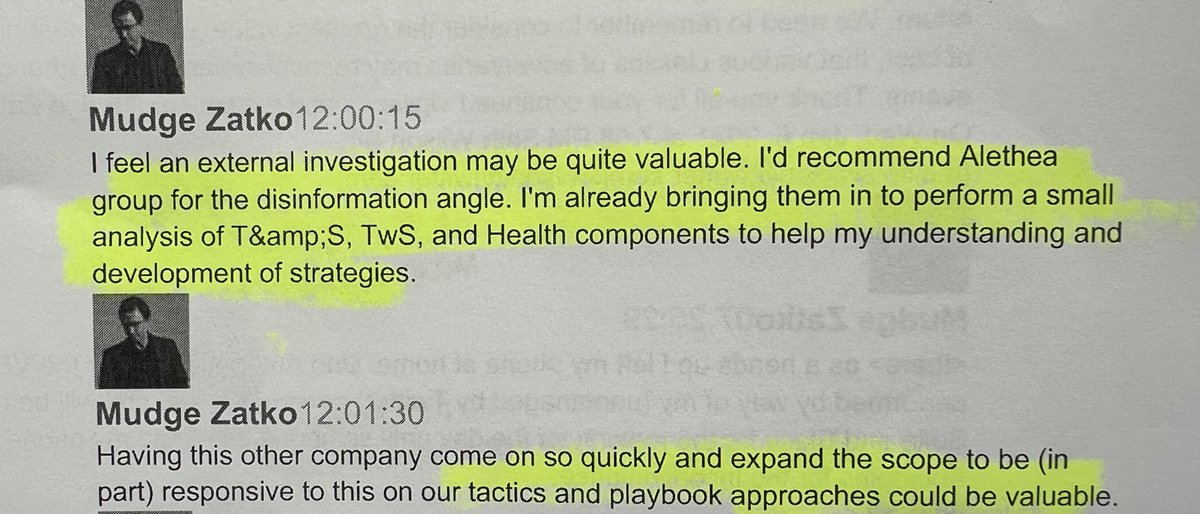

CIA, In-Q-Tel, And Alethea
Ted Schlein is partner at Ballistic Ventures and Kleiner Perkins, the legendary Silicon Valley VC firm. In 2022, Schlein led a $10 million Series A investment in Alethea Group for Ballistic, and sits on its board. Kaplan says she met Schlein that same year.
Schlein is also a member of the Board of Trustees of In-Q-Tel, or IQT, which is the CIA’s mission-driven venture capital firm.
In 2022, IQT published a summary report describing its “Disinformation Workshop.” The report recommended many activities similar to those Alethea has offered, including “Track the confluence of bad narratives.”
A full one-third of IQT investments were secret as of 2016, according to the Wall Street Journal.
The Journal also reported that Schlein had at least one connection to a firm in which IQT invested. And that was over seven years ago.
“I do not know Zatko, Jankowicz or Otis. Lisa is the CEO of Alethea and I serve on her board of directors,” Schlein told us. He added that he is not aware of any relationship between Alethea and the IC and that he has no operational role.
When asked if IQT had funded Alethea Group, Schlein said, “This is a question either the company or InQTel should answer, not me.”
“I get the feeling that Alethea is a byproduct of Ted Schlein,” a high-tech entrepreneur told us, “and the CEO is merely a titular head….Without meaningful experience, it's not clear to me how [Lisa Kaplan] received $10m in a series A round.”
In March 2022, the Department of Homeland Security made Schlein a member of its advisory council.wsj.com/articles/the-c…



Ted Schlein is partner at Ballistic Ventures and Kleiner Perkins, the legendary Silicon Valley VC firm. In 2022, Schlein led a $10 million Series A investment in Alethea Group for Ballistic, and sits on its board. Kaplan says she met Schlein that same year.
Schlein is also a member of the Board of Trustees of In-Q-Tel, or IQT, which is the CIA’s mission-driven venture capital firm.
In 2022, IQT published a summary report describing its “Disinformation Workshop.” The report recommended many activities similar to those Alethea has offered, including “Track the confluence of bad narratives.”
A full one-third of IQT investments were secret as of 2016, according to the Wall Street Journal.
The Journal also reported that Schlein had at least one connection to a firm in which IQT invested. And that was over seven years ago.
“I do not know Zatko, Jankowicz or Otis. Lisa is the CEO of Alethea and I serve on her board of directors,” Schlein told us. He added that he is not aware of any relationship between Alethea and the IC and that he has no operational role.
When asked if IQT had funded Alethea Group, Schlein said, “This is a question either the company or InQTel should answer, not me.”
“I get the feeling that Alethea is a byproduct of Ted Schlein,” a high-tech entrepreneur told us, “and the CEO is merely a titular head….Without meaningful experience, it's not clear to me how [Lisa Kaplan] received $10m in a series A round.”
In March 2022, the Department of Homeland Security made Schlein a member of its advisory council.wsj.com/articles/the-c…


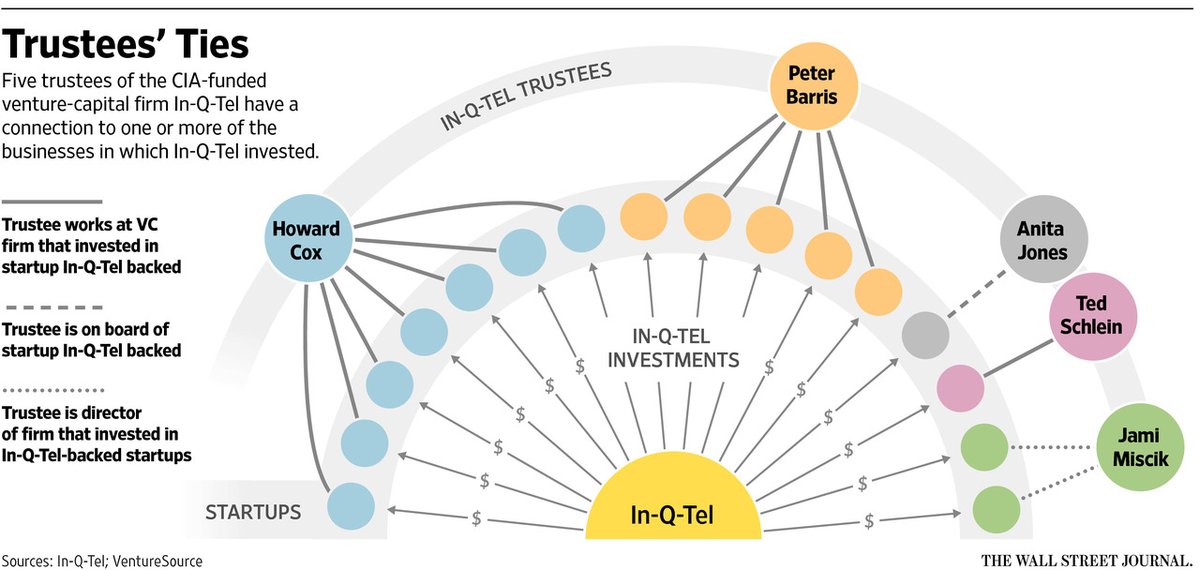
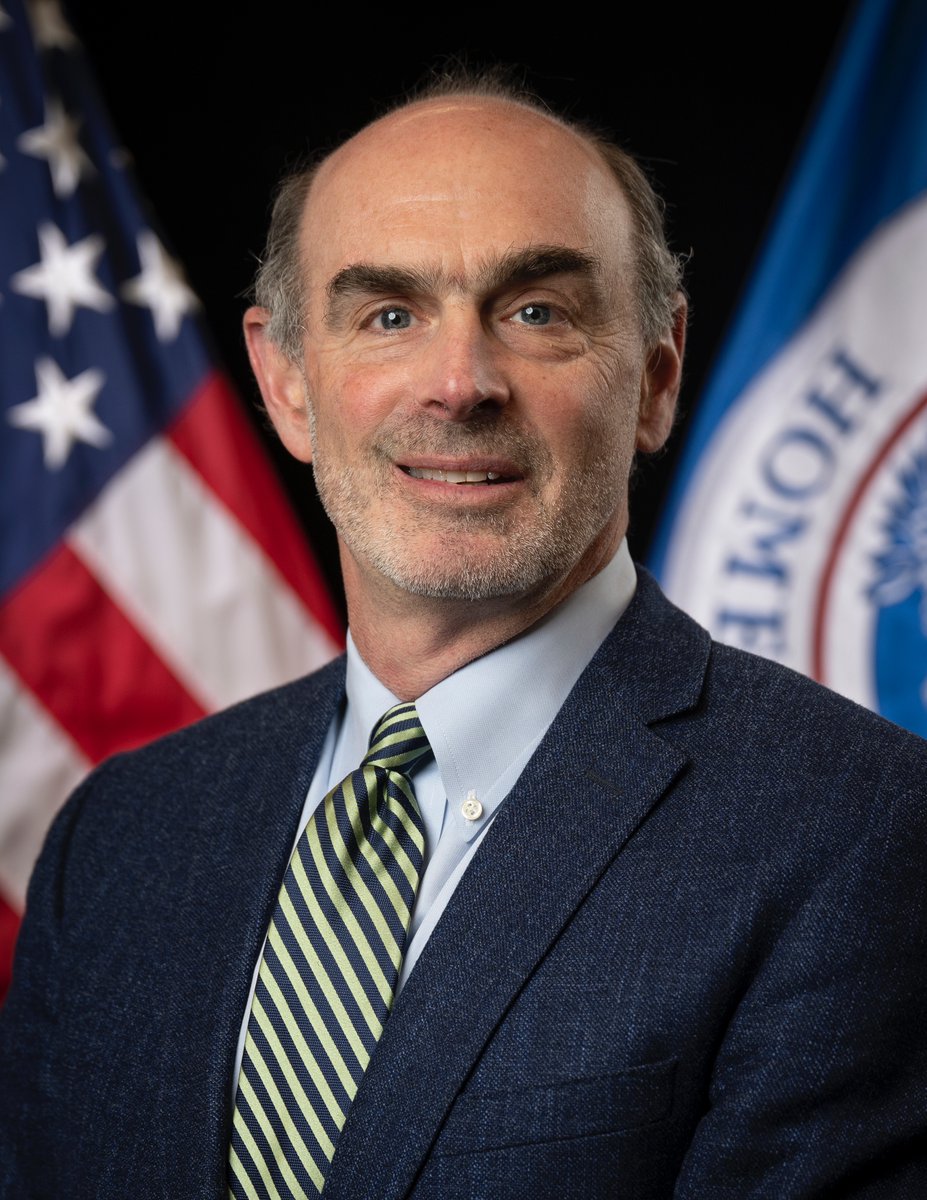
“Does this affect our approach to Trump?”
Another Alethea analyst is Patrick Conlon. From 2019 to 2022, Conlon was Twitter’s Global Lead of Threat Intelligence, where he ran Twitter’s “Threat Disruption” group. According to his bio, Conlon “also guided the process of selecting investigations for public disclosure in the Twitter Moderation Research Consortium.”
Before that, from 2013 to 2019, Conlon worked for the Defense Department as an intelligence analyst and linguist. According to Conlon’s LinkedIn profile, he speaks eight languages, including Russian, Ukrainian, and Chinese.
The Twitter Files show Conlon urging more censorship on multiple occasions within Twitter. After Yoel Roth tells Conlon that “Jack just approved repeat offender for civic integrity, Conlon replies, “Progress! Does this affect our approach to Trump, who I think that we publicly said had one remaining strike? Or does the incitement to violence aspect change that calculus?”
Shortly after, Conlon celebrates efforts to identify January 6 protesters. Conlon messages Roth to say, “One thing that’s made me smile today is that people in DC are getting on Bumble and other dating services to chat with protesters/rioters to gather info and send it to law enforcement.”
READ MORE: TWITTER FILES, PART 4 The Removal of Donald Trump: January 7
CLICK ON THE LINK BELOW TO CONTINUE READING THE REST OF THIS THREAD:




Another Alethea analyst is Patrick Conlon. From 2019 to 2022, Conlon was Twitter’s Global Lead of Threat Intelligence, where he ran Twitter’s “Threat Disruption” group. According to his bio, Conlon “also guided the process of selecting investigations for public disclosure in the Twitter Moderation Research Consortium.”
Before that, from 2013 to 2019, Conlon worked for the Defense Department as an intelligence analyst and linguist. According to Conlon’s LinkedIn profile, he speaks eight languages, including Russian, Ukrainian, and Chinese.
The Twitter Files show Conlon urging more censorship on multiple occasions within Twitter. After Yoel Roth tells Conlon that “Jack just approved repeat offender for civic integrity, Conlon replies, “Progress! Does this affect our approach to Trump, who I think that we publicly said had one remaining strike? Or does the incitement to violence aspect change that calculus?”
Shortly after, Conlon celebrates efforts to identify January 6 protesters. Conlon messages Roth to say, “One thing that’s made me smile today is that people in DC are getting on Bumble and other dating services to chat with protesters/rioters to gather info and send it to law enforcement.”
READ MORE: TWITTER FILES, PART 4 The Removal of Donald Trump: January 7
CLICK ON THE LINK BELOW TO CONTINUE READING THE REST OF THIS THREAD:
https://x.com/ShellenbergerMD/status/1604871630613753856
https://x.com/shellenberger/status/1793678149198471431




“We can draw a straight line… between the initial ‘Stop the Steal’ narratives and organizing to what ended up happening on the 6th.”
Alethea’s assessment of Twitter reflects the view of its CEO, Kaplan, that online misinformation leads to violence.
On March 11, 2021, the same day Baker flags the risk of working with Alethea without its law firm, Kaplan speaks on a panel at Harvard University’s Berkman School. While there, she blames misinformation on social media for the January 6 riot, and urges greater censorship.
Kaplan says Alethea Group flags misinformation for social media companies so it can be censored. She says “one option” is to “call the social media platforms and they say, ‘social media misinformation for the January 6 riot,’” but that Alethea does something better, which is to use “early detection” to “catch narratives when they start and we’re able to then track them and understand how they may be influencing individuals and seeking to change individuals behavior.”
January 6 was “an insurrection attempt,” says Kaplan, “We can draw a straight line from some of the narratives that were happening in March, saying that the election would be rigged, that there would be political violence…. The throughline you can draw between the initial ‘Stop the Steal’ narratives and organizing to what ended up happening on the 6th.”
She says Alethea will recommend filing lawsuits against people and “seek damages” of a punitive form. The goal is to stop opponents from “narrative building”
In response to our request for comment, Kaplan told us, “I worked in the United States Senate for a period of time. I have never worked directly for a US government agency, including the Intelligence Community. As this is true for both my time in college and after college, I suppose my relationship with the US Intelligence Community – or lack thereof – remains unchanged.”
Kaplan did not disclose to us how many contracts Alethea has had with US government agencies, writing, “We hold client confidentiality in the highest regard and do not disclose our customer relationships.”
Alethea’s assessment of Twitter reflects the view of its CEO, Kaplan, that online misinformation leads to violence.
On March 11, 2021, the same day Baker flags the risk of working with Alethea without its law firm, Kaplan speaks on a panel at Harvard University’s Berkman School. While there, she blames misinformation on social media for the January 6 riot, and urges greater censorship.
Kaplan says Alethea Group flags misinformation for social media companies so it can be censored. She says “one option” is to “call the social media platforms and they say, ‘social media misinformation for the January 6 riot,’” but that Alethea does something better, which is to use “early detection” to “catch narratives when they start and we’re able to then track them and understand how they may be influencing individuals and seeking to change individuals behavior.”
January 6 was “an insurrection attempt,” says Kaplan, “We can draw a straight line from some of the narratives that were happening in March, saying that the election would be rigged, that there would be political violence…. The throughline you can draw between the initial ‘Stop the Steal’ narratives and organizing to what ended up happening on the 6th.”
She says Alethea will recommend filing lawsuits against people and “seek damages” of a punitive form. The goal is to stop opponents from “narrative building”
In response to our request for comment, Kaplan told us, “I worked in the United States Senate for a period of time. I have never worked directly for a US government agency, including the Intelligence Community. As this is true for both my time in college and after college, I suppose my relationship with the US Intelligence Community – or lack thereof – remains unchanged.”
Kaplan did not disclose to us how many contracts Alethea has had with US government agencies, writing, “We hold client confidentiality in the highest regard and do not disclose our customer relationships.”
“Current State Assessment”
Alethea’s “Current State Assessment” of Twitter is scathing.
The analysis stresses that the social media platform’s Trust and Safety executives were well-meaning but also overwhelmed and unskilled. They didn’t have the resources they needed, it says.
The company was always on the defense when it came to misinformation, whether from “QAnon” or “coronavirus misinformation,” it claims. As a result, “historically marginalized groups” are vulnerable.
Alethea’s analysts conclude that the underlying problem was that “Twitter does not have a traditional threat intelligence capacity that would better position the company to be proactive on misinformation and disinformation.” Twitter, in particular, lacks “geographic expertise and foreign language capabilities.”
Another serious problem, says Alethea, is that “Twitter is not fully taking advantage of” its partnerships, such as with Stanford Internet Observatory (SIO), the only non-media partner Alethea names.
Previous Twitter Files and Facebook Files show that the DHS had asked SIO, which is led by a “former” CIA Fellow, Renee DiResta, and three other organizations to lead a “public-private” partnership to urge greater social media censorship of alleged misinformation relating to the 2020 elections and Covid.
“Neither I nor Alethea have a relationship with SIO,” Kaplan said.
READ ALETHEA’S “CURRENT STATE ASSESSMENT” HERE:
environmentalprogress.org/big-news/2024/…


Alethea’s “Current State Assessment” of Twitter is scathing.
The analysis stresses that the social media platform’s Trust and Safety executives were well-meaning but also overwhelmed and unskilled. They didn’t have the resources they needed, it says.
The company was always on the defense when it came to misinformation, whether from “QAnon” or “coronavirus misinformation,” it claims. As a result, “historically marginalized groups” are vulnerable.
Alethea’s analysts conclude that the underlying problem was that “Twitter does not have a traditional threat intelligence capacity that would better position the company to be proactive on misinformation and disinformation.” Twitter, in particular, lacks “geographic expertise and foreign language capabilities.”
Another serious problem, says Alethea, is that “Twitter is not fully taking advantage of” its partnerships, such as with Stanford Internet Observatory (SIO), the only non-media partner Alethea names.
Previous Twitter Files and Facebook Files show that the DHS had asked SIO, which is led by a “former” CIA Fellow, Renee DiResta, and three other organizations to lead a “public-private” partnership to urge greater social media censorship of alleged misinformation relating to the 2020 elections and Covid.
“Neither I nor Alethea have a relationship with SIO,” Kaplan said.
READ ALETHEA’S “CURRENT STATE ASSESSMENT” HERE:
environmentalprogress.org/big-news/2024/…

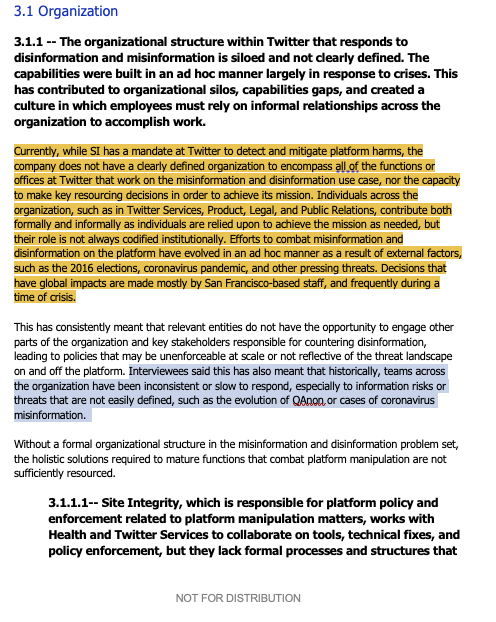

“More vigorous content moderation”
Before Alethea shares its full recommendations, Zatko pushes for more government-linked censorship. On March 24, 2021, Zatko emailed a 12-page report, “Recommendations to the Biden Administration On Regulating Disinformation and Other Harmful Content on Social Media,” to his colleagues.
“The organizations and people behind this recommendation,” Zatko explains, “have the connection [sic] to get this in front of the right people in the administration.”
The report is co-authored by Aspen Institute’s Vivian Schiller, who led the "pre-bunking" of the Hunter Biden laptop story, and Hamilton68 hoax author Clint Watts, and is published by the Mossavar-Rahmani Center at the Harvard Kennedy School and NYU Stern Center for Business and Human Rights.
The report calls for “more vigorous content moderation,” for the Biden administration to “work with social media companies to develop industry-wide standards” to respond to “known or suspected disinformation operations, whether domestic or foreign,” and for “altering financial incentives for platforms that fail to address the harms.”
The Biden "Administration should work with Congress to create such a regulatory body, possibly as a new Digital Bureau within the Federal Trade Commission..."
The report calls for new standards to be modeled after ESG and include “fines for violations” of “industry-wide standards” that would then be used to fund “credible local news outlets.” The report calls for social media platforms to pay for news content.
MORE ON VIVIAN SCHILLER, ASPEN:
MORE ON HAMILTON68 HOAX:
READ “RECOMMENDATIONS TO THE BIDEN ADMINISTRATION ON REGULATING DISINFORMATION” HERE:
environmentalprogress.org/big-news/2024/…


Before Alethea shares its full recommendations, Zatko pushes for more government-linked censorship. On March 24, 2021, Zatko emailed a 12-page report, “Recommendations to the Biden Administration On Regulating Disinformation and Other Harmful Content on Social Media,” to his colleagues.
“The organizations and people behind this recommendation,” Zatko explains, “have the connection [sic] to get this in front of the right people in the administration.”
The report is co-authored by Aspen Institute’s Vivian Schiller, who led the "pre-bunking" of the Hunter Biden laptop story, and Hamilton68 hoax author Clint Watts, and is published by the Mossavar-Rahmani Center at the Harvard Kennedy School and NYU Stern Center for Business and Human Rights.
The report calls for “more vigorous content moderation,” for the Biden administration to “work with social media companies to develop industry-wide standards” to respond to “known or suspected disinformation operations, whether domestic or foreign,” and for “altering financial incentives for platforms that fail to address the harms.”
The Biden "Administration should work with Congress to create such a regulatory body, possibly as a new Digital Bureau within the Federal Trade Commission..."
The report calls for new standards to be modeled after ESG and include “fines for violations” of “industry-wide standards” that would then be used to fund “credible local news outlets.” The report calls for social media platforms to pay for news content.
MORE ON VIVIAN SCHILLER, ASPEN:
MORE ON HAMILTON68 HOAX:
READ “RECOMMENDATIONS TO THE BIDEN ADMINISTRATION ON REGULATING DISINFORMATION” HERE:
https://x.com/shellenberger/status/1604897153121366017
https://x.com/mtaibbi/status/1619029772977455105
environmentalprogress.org/big-news/2024/…



"Expand formal and informal partnerships” with “Amazon Web Services, GoDaddy, or PayPal."
On April 20, 2021, a Twitter attorney emails a 32-page document titled “Alethea Group Recommendations.” It says, “Twitter has an opportunity to become the industry leader.”
How? At the top of the list is “Develop and expand threat intelligence capabilities.” This starts with hiring an “outside vendor to provide consistent threat intelligence feeds on priority markets or topics for Twitter, such as on COVID-19 misinformation, QAnon, violent hate groups, or foreign government-operated IO.”
Why an outside vendor? Because “Outside vendors often have access to more unique datasets, language capabilities, and geographic expertise,” Alethea reasons. ”This approach is consistent with Twitter’s platform peers, such as Facebook, and to a lesser extent, YouTube’s new analytic team focused on Sophisticated Threat Actors.”
The second major recommendation is to “Expand formal and informal partnerships” with “domain hosting companies, digital ad providers, and financial platforms, such as Amazon Web Services, GoDaddy, or PayPal.” Why? So that Twitter can respond to “threat actors in a more holistic fashion.”
In other words, Alethea is proposing that Twitter lead an effort to organize all other social media companies, e-commerce companies, and Internet Service Providers, to de-platform, de-monetize, and de-person disfavored individuals.
But would Twitter executives still make their own decisions about content moderation? Yes, affirms Alethea, but only after outsourcing “decision-making processes when it comes to disinformation and misinformation or a major security incident.”
Alethea also proposes developing systems to place content from purveyors of “misinformation and disinformation” in a “void” so that users can’t see or share it. “This could include not allowing content to load from their websites, sending users to an error page, having adversaries inadvertently (and unknowingly) tweet dog pictures, quinoa recipes, or sports scores.”
According to Alethea, “Threat intelligence could still be gathered within these artificial environments and used to inform future action against threat actors.”
Other recommendations from Alethea are for Twitter to“create a more diverse team,” expand reporting options for users, and “invest in a program that will teach news literacy to high school students and college students.”
Over email, Nina Jankowicz stressed to us that she had never seen the Alethea recommendations. “I never had contact with or access to Alethea customers or products. This was by design so as to protect customer confidential information. My role was entirely externally-facing.”
When we asked what motivated her to pursue a relationship with Twitter, Kaplan wrote, “We respect client confidentiality and cannot confirm any client relationships. I have not advocated for censorship and your allegations are false.”
“I have never and would never ask a social media platform to censor,” Kaplan told us. “I have flagged inauthentic coordinated behavior or what current X owner Mr. Elon Musk refers to as “the spam bots” which he seeks to “defeat” as they violate the terms of service for his and other platforms, as well as threats of violence against individuals. I have not urged social media companies to censor and that allegation is categorically false.”
Kaplan told us she was unaware that Zatko had repeatedly advocated for Twitter to hire Alethea.
READ ALETHEA’S “RECOMMENDATIONS” HERE:
environmentalprogress.org/big-news/2024/…



On April 20, 2021, a Twitter attorney emails a 32-page document titled “Alethea Group Recommendations.” It says, “Twitter has an opportunity to become the industry leader.”
How? At the top of the list is “Develop and expand threat intelligence capabilities.” This starts with hiring an “outside vendor to provide consistent threat intelligence feeds on priority markets or topics for Twitter, such as on COVID-19 misinformation, QAnon, violent hate groups, or foreign government-operated IO.”
Why an outside vendor? Because “Outside vendors often have access to more unique datasets, language capabilities, and geographic expertise,” Alethea reasons. ”This approach is consistent with Twitter’s platform peers, such as Facebook, and to a lesser extent, YouTube’s new analytic team focused on Sophisticated Threat Actors.”
The second major recommendation is to “Expand formal and informal partnerships” with “domain hosting companies, digital ad providers, and financial platforms, such as Amazon Web Services, GoDaddy, or PayPal.” Why? So that Twitter can respond to “threat actors in a more holistic fashion.”
In other words, Alethea is proposing that Twitter lead an effort to organize all other social media companies, e-commerce companies, and Internet Service Providers, to de-platform, de-monetize, and de-person disfavored individuals.
But would Twitter executives still make their own decisions about content moderation? Yes, affirms Alethea, but only after outsourcing “decision-making processes when it comes to disinformation and misinformation or a major security incident.”
Alethea also proposes developing systems to place content from purveyors of “misinformation and disinformation” in a “void” so that users can’t see or share it. “This could include not allowing content to load from their websites, sending users to an error page, having adversaries inadvertently (and unknowingly) tweet dog pictures, quinoa recipes, or sports scores.”
According to Alethea, “Threat intelligence could still be gathered within these artificial environments and used to inform future action against threat actors.”
Other recommendations from Alethea are for Twitter to“create a more diverse team,” expand reporting options for users, and “invest in a program that will teach news literacy to high school students and college students.”
Over email, Nina Jankowicz stressed to us that she had never seen the Alethea recommendations. “I never had contact with or access to Alethea customers or products. This was by design so as to protect customer confidential information. My role was entirely externally-facing.”
When we asked what motivated her to pursue a relationship with Twitter, Kaplan wrote, “We respect client confidentiality and cannot confirm any client relationships. I have not advocated for censorship and your allegations are false.”
“I have never and would never ask a social media platform to censor,” Kaplan told us. “I have flagged inauthentic coordinated behavior or what current X owner Mr. Elon Musk refers to as “the spam bots” which he seeks to “defeat” as they violate the terms of service for his and other platforms, as well as threats of violence against individuals. I have not urged social media companies to censor and that allegation is categorically false.”
Kaplan told us she was unaware that Zatko had repeatedly advocated for Twitter to hire Alethea.
READ ALETHEA’S “RECOMMENDATIONS” HERE:
environmentalprogress.org/big-news/2024/…
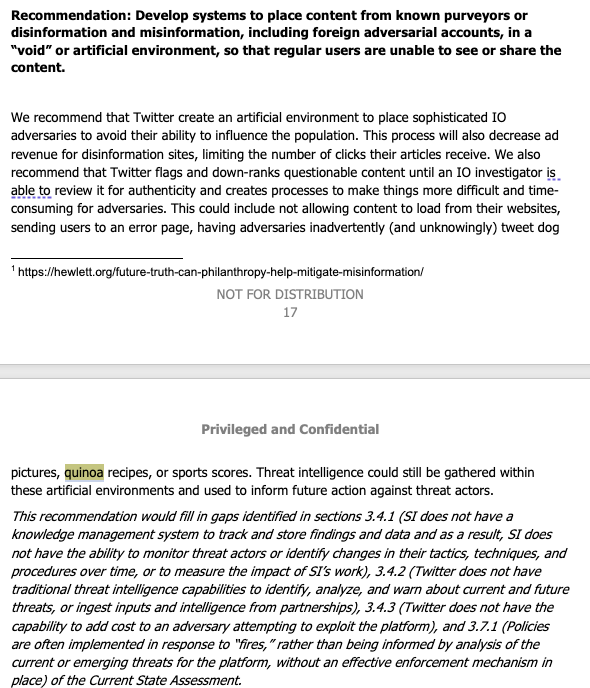



Alethea In, Zatko Out
Alethea proposed that Twitter outsource content management and moderation to it or to one of its allied organizations, perhaps SIO.
All of this might seem routine—consultants frequently use “analytical products” to sell future work.
Except in this case, Alethea was effectively urging Twitter to outsource its content management to IC intermediaries.
Twitter executives might have responded to Alethea’s proposal with shock and offense. After all, the firm, led by individuals tied to the IC and promoting censorship, had disparaged Twitter’s employees in a way that Twitter’s lawyers thought was a risk to the company. And Alethea was essentially proposing that it take over the decision-making and management of content moderation, which is at the core of what the company does.
Instead, Twitter doubled down on Alethea.
On July 11 and 12, 2021, Twitter’s Privacy team gives Alethea Group access to Twitter’s data from January 6.
On August 5, 2021, an attorney informs the Head of Site Integrity, Yoel Roth, that Twitter’s Chief Legal Officer, Vijaya Gadde, had hired Jenner & Block “to conduct a retrospective review of the conversation occurring on Twitter during the attack on the Capitol on January 6. They are also reviewing our election work that is tied to the insurrection as well.”
Two weeks later, Twitter finalizes a Statement of Work (“SOW”) contract with Alethea.
Listed as “Technical Research Director” is Nina Jankowicz.
The proposal consists of Alethea writing a 2020 Election Report, and list as an "option" item working to “provide a retrospective analysis of how then President Trump or other key figures may have violated Twitter’s policies, or otherwise leveraged the platform in a way that may have contributed to key events.”
Then, on August 23, 2021, Twitter fires Zatko.



Alethea proposed that Twitter outsource content management and moderation to it or to one of its allied organizations, perhaps SIO.
All of this might seem routine—consultants frequently use “analytical products” to sell future work.
Except in this case, Alethea was effectively urging Twitter to outsource its content management to IC intermediaries.
Twitter executives might have responded to Alethea’s proposal with shock and offense. After all, the firm, led by individuals tied to the IC and promoting censorship, had disparaged Twitter’s employees in a way that Twitter’s lawyers thought was a risk to the company. And Alethea was essentially proposing that it take over the decision-making and management of content moderation, which is at the core of what the company does.
Instead, Twitter doubled down on Alethea.
On July 11 and 12, 2021, Twitter’s Privacy team gives Alethea Group access to Twitter’s data from January 6.
On August 5, 2021, an attorney informs the Head of Site Integrity, Yoel Roth, that Twitter’s Chief Legal Officer, Vijaya Gadde, had hired Jenner & Block “to conduct a retrospective review of the conversation occurring on Twitter during the attack on the Capitol on January 6. They are also reviewing our election work that is tied to the insurrection as well.”
Two weeks later, Twitter finalizes a Statement of Work (“SOW”) contract with Alethea.
Listed as “Technical Research Director” is Nina Jankowicz.
The proposal consists of Alethea writing a 2020 Election Report, and list as an "option" item working to “provide a retrospective analysis of how then President Trump or other key figures may have violated Twitter’s policies, or otherwise leveraged the platform in a way that may have contributed to key events.”
Then, on August 23, 2021, Twitter fires Zatko.




“We have to trust the rules and the systems that are governing us.”
On February 21, 2022, at Colby College, Alethea’s Kaplan again promotes an aggressive censorship vision, including punishments for people who spread misinformation, and says “we have to trust” election rules.
“I think we can get to the point where the government's doing everything that we think it can do within our comfort zone as a democracy,” she says. “But I think that we will need private companies to step up.”
Kaplan says free speech threatens democracy. “I continue to be concerned about what it means that that segment of the population doesn't buy into our democratic system. And so putting politics aside when we're talking about democracy, we have to trust it. We have to trust the rules and the systems that are governing us.”
Kaplan says 20% of Alethea’s business was with the government.
Kaplan also says Alethea Group sometimes donates time to social media companies.
“Sometimes we do catch things out in the wild and we'll bring that to companies. We don't, like, get paid for that when we do that. But, like, we'll do it if it's something that's pretty egregious that they think they should be aware of.”
Kaplan points out the threat of election misinformation to political instability in Brazil. A few months later, in July 2022, Twitter hires Alethea to “Assist Counsel with fact gathering and analysis of misinformation/disinformation threats related to the 2022 Brazil election.”
On August 4, 2022, Roth tells a colleague that Alethea is “providing services to us at a more than 50% discount over rack rate (a savings of approximately $50K for the specific cases here)...” for a Brazil misinformation analysis.
On February 21, 2022, at Colby College, Alethea’s Kaplan again promotes an aggressive censorship vision, including punishments for people who spread misinformation, and says “we have to trust” election rules.
“I think we can get to the point where the government's doing everything that we think it can do within our comfort zone as a democracy,” she says. “But I think that we will need private companies to step up.”
Kaplan says free speech threatens democracy. “I continue to be concerned about what it means that that segment of the population doesn't buy into our democratic system. And so putting politics aside when we're talking about democracy, we have to trust it. We have to trust the rules and the systems that are governing us.”
Kaplan says 20% of Alethea’s business was with the government.
Kaplan also says Alethea Group sometimes donates time to social media companies.
“Sometimes we do catch things out in the wild and we'll bring that to companies. We don't, like, get paid for that when we do that. But, like, we'll do it if it's something that's pretty egregious that they think they should be aware of.”
Kaplan points out the threat of election misinformation to political instability in Brazil. A few months later, in July 2022, Twitter hires Alethea to “Assist Counsel with fact gathering and analysis of misinformation/disinformation threats related to the 2022 Brazil election.”
On August 4, 2022, Roth tells a colleague that Alethea is “providing services to us at a more than 50% discount over rack rate (a savings of approximately $50K for the specific cases here)...” for a Brazil misinformation analysis.
“Zatko was aware of this issue, having learned about it separately through a contact at the CIA…”
Recall that, on August 21, 2022, Twitter executives wrote talking points to respond to Zatko’s allegations, and one of them was that “Zatko had engaged with members of US intelligence agencies and sought to enter a formal agreement that would allow him to work with them and provide information to them.”
Fast-forward five weeks to October 1, 2022, and a Twitter attorney at WilmerHale emails draft talking points for Twitter to use with the Department of Justice in addressing Zatko’s claims.
One section addresses a claim by Zatko that Twitter received “specific information” that Twitter employees were “working on behalf of another particular foreign intelligence agency.”
Writes Twitter’s attorney, “He’s wrong here too.”
The FBI had contacted Twitter about an employee “who potentially had contact with an individual with a possible connection to China. There was no indication that this individual was in fact a foreign agent with ties to a foreign government, and the apparent person of interest was the contact of the Twitter employee, not the Twitter employee.”
Then, the attorney noted, Twitter’s head of Corporate Security “was informed by the member of Zatko’s team that Zatko was aware of this issue, having learned about it separately through a contact at the CIA…”

Recall that, on August 21, 2022, Twitter executives wrote talking points to respond to Zatko’s allegations, and one of them was that “Zatko had engaged with members of US intelligence agencies and sought to enter a formal agreement that would allow him to work with them and provide information to them.”
Fast-forward five weeks to October 1, 2022, and a Twitter attorney at WilmerHale emails draft talking points for Twitter to use with the Department of Justice in addressing Zatko’s claims.
One section addresses a claim by Zatko that Twitter received “specific information” that Twitter employees were “working on behalf of another particular foreign intelligence agency.”
Writes Twitter’s attorney, “He’s wrong here too.”
The FBI had contacted Twitter about an employee “who potentially had contact with an individual with a possible connection to China. There was no indication that this individual was in fact a foreign agent with ties to a foreign government, and the apparent person of interest was the contact of the Twitter employee, not the Twitter employee.”
Then, the attorney noted, Twitter’s head of Corporate Security “was informed by the member of Zatko’s team that Zatko was aware of this issue, having learned about it separately through a contact at the CIA…”


Who is Zatko, really?
Zatko is a longstanding contractor and employee of the federal government. He gave training seminars to the NSA and NASA in 1999 and perhaps earlier.
Two books, Andy Greenberg’s 2013 This Machine Kills Secrets and Joseph Menn’s 2019 Cult of the Dead Cow, describe in detail how the IC and Defense Department have financed and directed Zatko’s work for over a quarter-century.
Zatko was part of a group of hackers, or computer tinkerers, in Cambridge, Massachusetts. The members of the group, “L0pht,” had access to early, expensive, and scarce computers and other cutting-edge technological innovations, including a motor-driven satellite dish and multiple computer systems in 1998. They testified to the US Senate that same year (see excerpts in the video below).
In 2000, Zatko changed the name of L0pht to @stake. Four years earlier he had joined another hacker collective, the “Cult of the Dead Cow.” Members of both groups worked for the CIA, NSA, and DARPA directly or indirectly as contractors for firms like BBN.
In 2006, @stake’s CEO Chris Darby became the CEO of In-Q-Tel, the CIA VC firm. Another @stake employee became its chief information security officer. Former Facebook executive Alex Stamos, who helped run the Stanford Internet Observatory’s censorship effort with former CIA Fellow Diresta for DHS, also worked for @stake.
Zatko was Technical Director for National Intelligence Research and Applications for BBN, a contractor for the Defense Department, from 2004 to 2010. From 2010 to 2013, Zatko worked for DARPA to prevent “insider threats” using a threat model, Zatko said, “largely derived from counter-intelligence/counter-espionage (CI/CE) models.”
Zatko’s work for DARPA focused heavily on ways to prevent government employees and contractors from leaking information, including ways of directly and invasively monitoring them physically.
From 2013 to 2015, in response to Edward Snowden’s revelations of mass surveillance, Zatko worked at Google to engineer software. Afterward, Zatko started advising Sen. Mark Warner, one of the Senate’s leading proponents of social media censorship.
During the same period Zatko was helping track whistleblowers for DARPA, President Barack Obama was pursuing more leakers for prosecution than all previous presidential administrations.
Zatko is a longstanding contractor and employee of the federal government. He gave training seminars to the NSA and NASA in 1999 and perhaps earlier.
Two books, Andy Greenberg’s 2013 This Machine Kills Secrets and Joseph Menn’s 2019 Cult of the Dead Cow, describe in detail how the IC and Defense Department have financed and directed Zatko’s work for over a quarter-century.
Zatko was part of a group of hackers, or computer tinkerers, in Cambridge, Massachusetts. The members of the group, “L0pht,” had access to early, expensive, and scarce computers and other cutting-edge technological innovations, including a motor-driven satellite dish and multiple computer systems in 1998. They testified to the US Senate that same year (see excerpts in the video below).
In 2000, Zatko changed the name of L0pht to @stake. Four years earlier he had joined another hacker collective, the “Cult of the Dead Cow.” Members of both groups worked for the CIA, NSA, and DARPA directly or indirectly as contractors for firms like BBN.
In 2006, @stake’s CEO Chris Darby became the CEO of In-Q-Tel, the CIA VC firm. Another @stake employee became its chief information security officer. Former Facebook executive Alex Stamos, who helped run the Stanford Internet Observatory’s censorship effort with former CIA Fellow Diresta for DHS, also worked for @stake.
Zatko was Technical Director for National Intelligence Research and Applications for BBN, a contractor for the Defense Department, from 2004 to 2010. From 2010 to 2013, Zatko worked for DARPA to prevent “insider threats” using a threat model, Zatko said, “largely derived from counter-intelligence/counter-espionage (CI/CE) models.”
Zatko’s work for DARPA focused heavily on ways to prevent government employees and contractors from leaking information, including ways of directly and invasively monitoring them physically.
From 2013 to 2015, in response to Edward Snowden’s revelations of mass surveillance, Zatko worked at Google to engineer software. Afterward, Zatko started advising Sen. Mark Warner, one of the Senate’s leading proponents of social media censorship.
During the same period Zatko was helping track whistleblowers for DARPA, President Barack Obama was pursuing more leakers for prosecution than all previous presidential administrations.
“There are deep cover people who are known to be CIA and who go to DARPA and then wherever.”
Pieter Mudge Zatko (Getty Images)
We asked a senior intelligence analyst who has worked for decades within both the US military and the IC if the Alethea-Twitter operation looked like a “clandestine information operation.”
The person laughed. “You just laid it out. DARPA fits the pattern. There are deep-cover people who are known to be CIA and who go to DARPA. They have assumed a mantle that they are no longer aligned in that world. They try to portray themselves as separate and apart. That works to their favor. But they are still inside.”
Front groups and intermediaries, or “cut-outs,” are the bread and butter of clandestine operations and have been since World War II.
“We front monies through different shell companies and nobody knows there are governments behind them,” the person said. “That’s a lot of what we did in Ukraine, Eastern Europe, and the Arab Spring… with disinformation, censoring, and manipulating.”
Given this context, Zatko’s efforts to share information with intelligence agencies and bring in the IC-linked Alethea Group may have been a deliberate operation by the IC to infiltrate and control Twitter.
Pieter Mudge Zatko (Getty Images)
We asked a senior intelligence analyst who has worked for decades within both the US military and the IC if the Alethea-Twitter operation looked like a “clandestine information operation.”
The person laughed. “You just laid it out. DARPA fits the pattern. There are deep-cover people who are known to be CIA and who go to DARPA. They have assumed a mantle that they are no longer aligned in that world. They try to portray themselves as separate and apart. That works to their favor. But they are still inside.”
Front groups and intermediaries, or “cut-outs,” are the bread and butter of clandestine operations and have been since World War II.
“We front monies through different shell companies and nobody knows there are governments behind them,” the person said. “That’s a lot of what we did in Ukraine, Eastern Europe, and the Arab Spring… with disinformation, censoring, and manipulating.”
Given this context, Zatko’s efforts to share information with intelligence agencies and bring in the IC-linked Alethea Group may have been a deliberate operation by the IC to infiltrate and control Twitter.
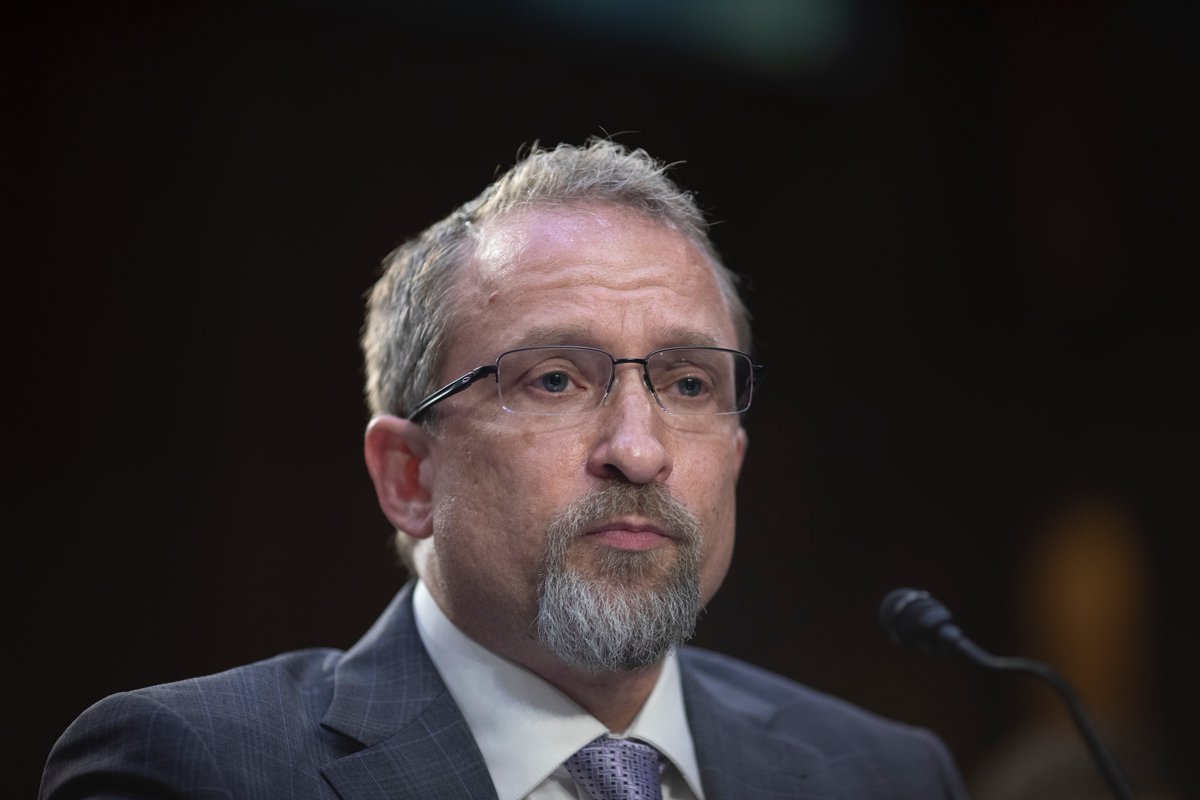
“Twitter can’t afford to be one of the world’s most influential websites.”
The news media lavished praise on Zatko and used his denunciation to demand for greater government regulation of the company.
“Twitter can’t afford to be one of the world’s most influential websites,” declared the Washington Post.
“The audit report by the Alethea Group, a company that fights disinformation threats,” wrote the Post approvingly, “confirms that sense, depicting a company overwhelmed by well-orchestrated disinformation campaigns and short on engineering tools and human firepower while facing threats on par with vastly better-financed Google and Facebook.”
Other advocates of censorship chimed in to support Zatko.
Twitter “has this outsized role in public discourse but it’s still staffed like a midsize platform,” said Graham Brookie, who ran DHS’s mass censorship program with Stamos and DiResta of Stanford Internet Observatory. “They struggle to do more than one thing at one time.”
In an internal Atlantic Council email sent on July 21 2020, Brookie wrote to a colleague to say, "I know the Council has a number of efforts on broad policy around the elections, but we just set up an election integrity partnership at the request of DHS/CISA and are in weekly comms to debrief about disinfo, IO, etc.”

The news media lavished praise on Zatko and used his denunciation to demand for greater government regulation of the company.
“Twitter can’t afford to be one of the world’s most influential websites,” declared the Washington Post.
“The audit report by the Alethea Group, a company that fights disinformation threats,” wrote the Post approvingly, “confirms that sense, depicting a company overwhelmed by well-orchestrated disinformation campaigns and short on engineering tools and human firepower while facing threats on par with vastly better-financed Google and Facebook.”
Other advocates of censorship chimed in to support Zatko.
Twitter “has this outsized role in public discourse but it’s still staffed like a midsize platform,” said Graham Brookie, who ran DHS’s mass censorship program with Stamos and DiResta of Stanford Internet Observatory. “They struggle to do more than one thing at one time.”
In an internal Atlantic Council email sent on July 21 2020, Brookie wrote to a colleague to say, "I know the Council has a number of efforts on broad policy around the elections, but we just set up an election integrity partnership at the request of DHS/CISA and are in weekly comms to debrief about disinfo, IO, etc.”
https://x.com/shellenberger/status/1722017433219973270

“The Big Boss”
In her April 2023 testimony to the House Judiciary Committee, Nina Jankowicz described herself as a low- to mid-level official at the Department of Homeland Security who was thrown under the bus in the wake of a bipartisan backlash against the “Disinformation Governance Board” that she was nominated to lead.
But others treated Jankowicz as though she were more senior than that. Four years ago, in February 2020, former Congressperson Jane Harman, the CEO of the influential US government-funded Wilson Center, referred three times to Jankowicz as “the big boss.” Later Harman called Jankowicz the “ringleader.”
“Jane has a very colorful way of speaking,” said Jankowicz about Harman’s statements. “This is her way of acknowledging the work I did to organize that event, not ‘for my sweeping vision for government censorship and disinformation.’”
From 2022 to April 2024, Jankowicz worked for the Center for Information Resilience, which receives funding from US, UK, and Australian governments. The work was an extension of what she has done since 2013, when Jankowicz worked as a Program Officer for the National Endowment for Democracy’s National Democratic Institute (NDI) in Eastern Europe. Her LinkedIn says she ”Managed six active projects supporting democracy assistance to Russia and Belarus.”
Independent journalists, analysts, and most in the IC understand that the NDI and its broader organization, the National Endowment for Democracy, are US government-funded intermediaries or “cut-outs” working alongside the CIA.
This relationship has been well-understood for over three decades:
Jankowicz disagrees. “This is a false assertion,” she told us over email, “and — during my time at NDI — it was an assertion most frequently made by the Kremlin. The only linkage I am aware of between the U.S. intelligence community and NDI is that they both broadly support U.S. foreign policy goals.”
Jankowicz told us that she’s "vehemently opposed to censorship."
“My first piece of published work as Disinformation Fellow at the Wilson Center was this report, which explores the many antidemocratic pitfalls of regulating disinformation. The opening of the paper states clearly: ‘While the American response to online disinformation has been marked by partisanship and gridlock, at least 50 other nations have taken action against it, often to the detriment of human rights and democratic standards.’ (Emphasis added).”
But Jankowicz also acknowledged to us that she supported social media censorship of COVID-19 posts (see video below.)
“Yes,” she said over email yesterday, “I commended the social media companies for removing posts that claimed that COVID-19 was something Brazilians should not treat seriously at the height of a deadly pandemic that ended up claiming 700,000+ Brazilian lives.
“I still believe that was the right decision,” she said, “and it was the platforms’ decision to make. When we sign up to use social platforms, whether we are presidents or private citizens, we agree to their terms of service, including that they may moderate content.”
In February 2020, Jankowicz urged global social media “regulation” by governments and touted the “International Grand Committee” [on Disinformation]’s work to find principles of regulation. The goal of the Wilson Center meeting was to tout what other governments, including France and Brazil, were doing to demand censorship and suggest that the US was lagging behind.
At that meeting, Sen. Mark Warner advocated global social media regulation through a military alliance framework, saying, “We can’t do this [fight misinformation] without — well, even beyond — the Five Eyes. And even well beyond NATO.”
On April 7, 2020, Jankowicz once again praised social media censorship and agreed with Anya Prusa, who praised social media companies for “removing posts” by Brazil’s president. The US IC, specifically the FBI, has advised Brazil on censorship.
The TWITTER FILES - CIA offer more proof that Jankowicz got over her skis in the "information war." And in that sense, she was a victim, but of passion.
Indeed, it was only thanks to Jankowicz’s recent efforts to rehabilitate her image that we discovered her role in the Alethea Group, the firm’s links to the CIA, and Zatko’s work for intelligence agencies. Without Jankowicz, the whole episode would have been lost to history.washingtonpost.com/archive/opinio…
In her April 2023 testimony to the House Judiciary Committee, Nina Jankowicz described herself as a low- to mid-level official at the Department of Homeland Security who was thrown under the bus in the wake of a bipartisan backlash against the “Disinformation Governance Board” that she was nominated to lead.
But others treated Jankowicz as though she were more senior than that. Four years ago, in February 2020, former Congressperson Jane Harman, the CEO of the influential US government-funded Wilson Center, referred three times to Jankowicz as “the big boss.” Later Harman called Jankowicz the “ringleader.”
“Jane has a very colorful way of speaking,” said Jankowicz about Harman’s statements. “This is her way of acknowledging the work I did to organize that event, not ‘for my sweeping vision for government censorship and disinformation.’”
From 2022 to April 2024, Jankowicz worked for the Center for Information Resilience, which receives funding from US, UK, and Australian governments. The work was an extension of what she has done since 2013, when Jankowicz worked as a Program Officer for the National Endowment for Democracy’s National Democratic Institute (NDI) in Eastern Europe. Her LinkedIn says she ”Managed six active projects supporting democracy assistance to Russia and Belarus.”
Independent journalists, analysts, and most in the IC understand that the NDI and its broader organization, the National Endowment for Democracy, are US government-funded intermediaries or “cut-outs” working alongside the CIA.
This relationship has been well-understood for over three decades:
Jankowicz disagrees. “This is a false assertion,” she told us over email, “and — during my time at NDI — it was an assertion most frequently made by the Kremlin. The only linkage I am aware of between the U.S. intelligence community and NDI is that they both broadly support U.S. foreign policy goals.”
Jankowicz told us that she’s "vehemently opposed to censorship."
“My first piece of published work as Disinformation Fellow at the Wilson Center was this report, which explores the many antidemocratic pitfalls of regulating disinformation. The opening of the paper states clearly: ‘While the American response to online disinformation has been marked by partisanship and gridlock, at least 50 other nations have taken action against it, often to the detriment of human rights and democratic standards.’ (Emphasis added).”
But Jankowicz also acknowledged to us that she supported social media censorship of COVID-19 posts (see video below.)
“Yes,” she said over email yesterday, “I commended the social media companies for removing posts that claimed that COVID-19 was something Brazilians should not treat seriously at the height of a deadly pandemic that ended up claiming 700,000+ Brazilian lives.
“I still believe that was the right decision,” she said, “and it was the platforms’ decision to make. When we sign up to use social platforms, whether we are presidents or private citizens, we agree to their terms of service, including that they may moderate content.”
In February 2020, Jankowicz urged global social media “regulation” by governments and touted the “International Grand Committee” [on Disinformation]’s work to find principles of regulation. The goal of the Wilson Center meeting was to tout what other governments, including France and Brazil, were doing to demand censorship and suggest that the US was lagging behind.
At that meeting, Sen. Mark Warner advocated global social media regulation through a military alliance framework, saying, “We can’t do this [fight misinformation] without — well, even beyond — the Five Eyes. And even well beyond NATO.”
On April 7, 2020, Jankowicz once again praised social media censorship and agreed with Anya Prusa, who praised social media companies for “removing posts” by Brazil’s president. The US IC, specifically the FBI, has advised Brazil on censorship.
The TWITTER FILES - CIA offer more proof that Jankowicz got over her skis in the "information war." And in that sense, she was a victim, but of passion.
Indeed, it was only thanks to Jankowicz’s recent efforts to rehabilitate her image that we discovered her role in the Alethea Group, the firm’s links to the CIA, and Zatko’s work for intelligence agencies. Without Jankowicz, the whole episode would have been lost to history.washingtonpost.com/archive/opinio…
First Amendment vs. “Information War”
The paradigm promoted by Jankowicz, Harman, Zatko, Kaplan, Schlein, Otis and many others within the IC and its cut-outs is fundamentally a military communications paradigm, not a peaceful civilian one.
The peaceful civilian approach to “fighting misinformation” is free speech, as enshrined in the First Amendment to the US Constitution.
The three of us and hundreds of other journalists, authors, and artists last year described our peaceful approach to fighting misinformation in "The Westminster Declaration."
Free people in free societies do not and should not want their governments waging “hybrid warfare,” “information warfare,” or “information operations” against them.
They do not want the leaders of their IC agencies demonizing and seeking to de-platform or de-monetize domestic voices, no matter how annoying or wrong those voices may be. The American people and the American courts, including the Supreme Court, have repeatedly sided with the strongest protections of free speech in the world.
Whether or not the CIA or another IC agency controlled the Alethea Group, it behaved as either a front group or an intermediary of the IC. It could be that individuals in the Alethea Group with ties to the IC were acting more through a common ideology, or in service of a political party. We may never know.
What we do know is that their goals and behaviors are unAmerican in spirit and unconstitutional in the law. CIA and US military employees or contractors must never spy upon or run clandestine operations against American citizens on US soil.
That so many of them apparently did so in order to bring America’s most influential social media company under the authority of the IC is a dark moment in American history.
westminsterdeclaration.org
westminsterdeclaration.org
The paradigm promoted by Jankowicz, Harman, Zatko, Kaplan, Schlein, Otis and many others within the IC and its cut-outs is fundamentally a military communications paradigm, not a peaceful civilian one.
The peaceful civilian approach to “fighting misinformation” is free speech, as enshrined in the First Amendment to the US Constitution.
The three of us and hundreds of other journalists, authors, and artists last year described our peaceful approach to fighting misinformation in "The Westminster Declaration."
Free people in free societies do not and should not want their governments waging “hybrid warfare,” “information warfare,” or “information operations” against them.
They do not want the leaders of their IC agencies demonizing and seeking to de-platform or de-monetize domestic voices, no matter how annoying or wrong those voices may be. The American people and the American courts, including the Supreme Court, have repeatedly sided with the strongest protections of free speech in the world.
Whether or not the CIA or another IC agency controlled the Alethea Group, it behaved as either a front group or an intermediary of the IC. It could be that individuals in the Alethea Group with ties to the IC were acting more through a common ideology, or in service of a political party. We may never know.
What we do know is that their goals and behaviors are unAmerican in spirit and unconstitutional in the law. CIA and US military employees or contractors must never spy upon or run clandestine operations against American citizens on US soil.
That so many of them apparently did so in order to bring America’s most influential social media company under the authority of the IC is a dark moment in American history.
westminsterdeclaration.org
westminsterdeclaration.org
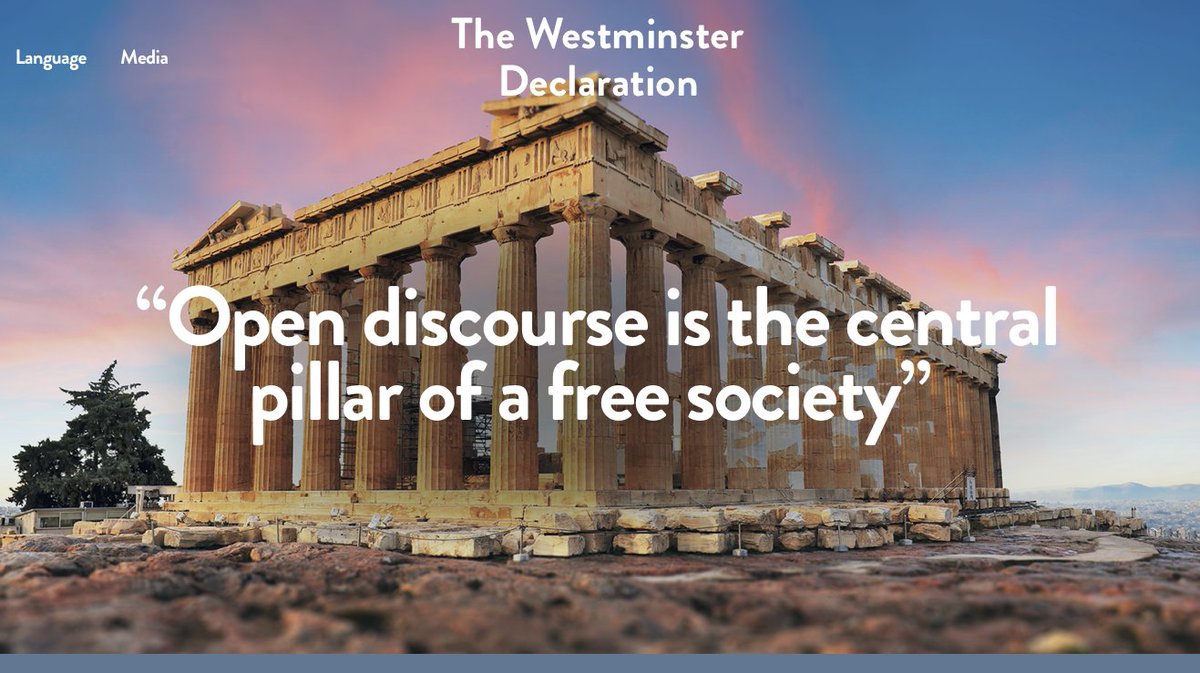
CODA
Unfortunately, the dark moment is not behind us.
Governments around the world are cracking down on free speech more than they have at any other time since Twitter was founded in 2006.
In 2019, Twitter published an internal report, “Content Regulation: Global Regulatory Update,” on demands by various governments for more censorship.
“The challenges these types of content laws present are numerous,” company executives wrote. “The laws may, as applied to specific situations, challenge Twitter’s longstanding commitment to increasing conversation and dialogue on the platform.”
Government censorship demands have become increasingly severe in just the last five years:
— The 2019 report barely mentions Brazil, noting that its data privacy law "will be subject to ongoing discussions..." Today, Brazil is demanding that disfavored journalists and politicians be de-platformed and blocked entirely, at a global level, from social media platforms.
— The 2019 report talks about the French government demanding that posts be taken down; last week, the French government blocked a social media platform entirely in a foreign territory.
— The 2019 report talks about the demands of the “Sharing of Abhorrent Violent Material Act” law in Australia; last month, the Australian government demanded a global ban on such material, not just in Australia.
For many years to come, powerful voices in Western societies will likely continue to demand more censorship by social media platforms. From now on, the CIA, military, intelligence, and other security agencies must not be among them.
/END

Unfortunately, the dark moment is not behind us.
Governments around the world are cracking down on free speech more than they have at any other time since Twitter was founded in 2006.
In 2019, Twitter published an internal report, “Content Regulation: Global Regulatory Update,” on demands by various governments for more censorship.
“The challenges these types of content laws present are numerous,” company executives wrote. “The laws may, as applied to specific situations, challenge Twitter’s longstanding commitment to increasing conversation and dialogue on the platform.”
Government censorship demands have become increasingly severe in just the last five years:
— The 2019 report barely mentions Brazil, noting that its data privacy law "will be subject to ongoing discussions..." Today, Brazil is demanding that disfavored journalists and politicians be de-platformed and blocked entirely, at a global level, from social media platforms.
— The 2019 report talks about the French government demanding that posts be taken down; last week, the French government blocked a social media platform entirely in a foreign territory.
— The 2019 report talks about the demands of the “Sharing of Abhorrent Violent Material Act” law in Australia; last month, the Australian government demanded a global ban on such material, not just in Australia.
For many years to come, powerful voices in Western societies will likely continue to demand more censorship by social media platforms. From now on, the CIA, military, intelligence, and other security agencies must not be among them.
/END
https://x.com/shellenberger/status/1775516415023251835
https://x.com/shellenberger/status/1792590305931272693
https://x.com/shellenberger/status/1782912099397857608
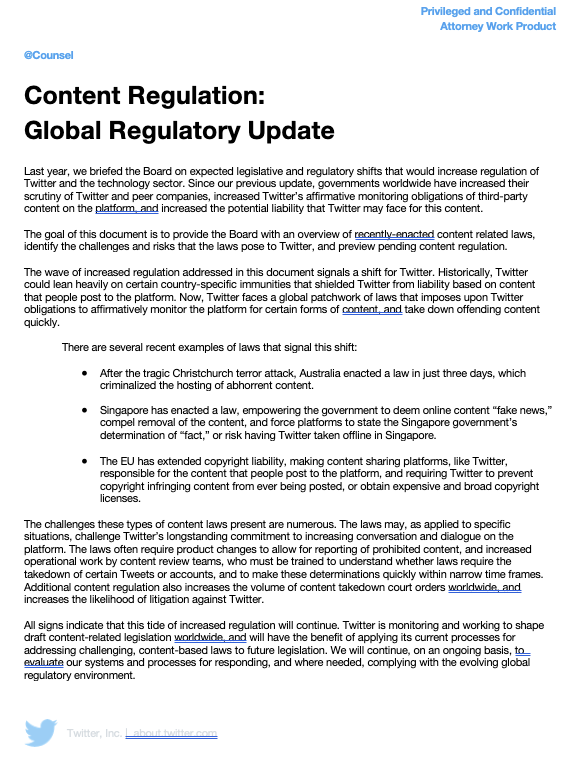
A CORRECTION AND AN ADDITION:
— Three people, Jankowicz, Schlein, and Kaplan, not just one, got back to us. We incorporated their comments in the thread above, but the first post incorrectly says only one person did.
— Attached is Zatko's email pushing the Harvard pro-censorship white paper, aimed at the Biden administration, to Twitter staff, which I neglected to include above.
— Three people, Jankowicz, Schlein, and Kaplan, not just one, got back to us. We incorporated their comments in the thread above, but the first post incorrectly says only one person did.
— Attached is Zatko's email pushing the Harvard pro-censorship white paper, aimed at the Biden administration, to Twitter staff, which I neglected to include above.
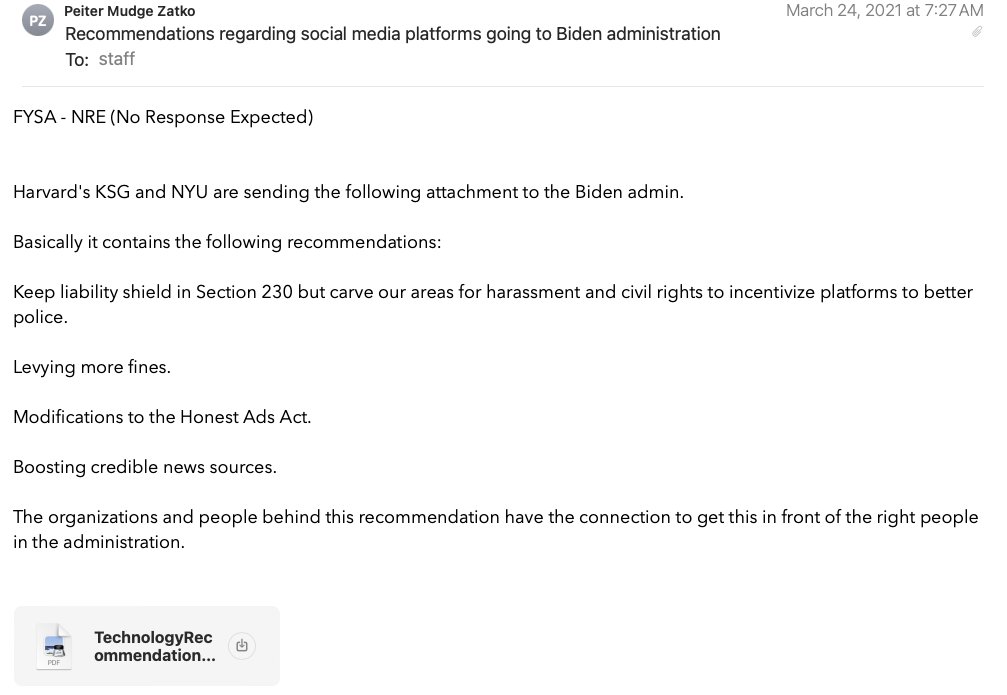
• • •
Missing some Tweet in this thread? You can try to
force a refresh



